Selling
| Older Posts |
Last Call (Just About) For Selling Your Home In 2024! |
|
 Most contracts (and buyers and sellers) have been making it to closing within about 30 to 45 days. Which means, that if you decide today that you're going to sell your house, and we have it on the market by the end of October, and it is under contract within 7 to 10 days (by Nov 7 or Nov 10) a buyer might be proposing a closing date of December 15 or 20 or 30. So, as much as it might seem like there is plenty of time left this year... if you are hoping to sell your home this year, or before the holidays, you will likely need to start putting plans in place now (over the next week) to get your house on the market. You can, of course, list your home in November or December and plan to close in January or February -- but if you want to have it sold and closed by the holidays, or by the end of the year, the time to act is now! | |
Sometimes An Offer Is So Strong A Seller Will Not Wait For Other Imminent Offers |
|
 Wahoo! An exciting new listing just hit the market. You are excited to go see it and will definitely consider making an offer. You know it will likely be a popular listing, with the potential for multiple offers, but you have already been pre-approved for your mortgage, you are going to see the house on the first day it is on the market, and you will likely make an offer on the second day that it is on the market. That should be enough, right? Well, maybe. Sometimes, an offer shows up that is strong enough to cause a seller to adjust how they were otherwise planning to receive and consider offers. If an offer comes in on the fictional house above on the afternoon of the first day that it is on the market... that is above asking price, cash, without an inspection, with a closing to take place in 20 days, with the seller able to rent back for free for up to three months... 1. Who could blame the seller for going ahead and accepting this very (very!) strong offer. 2. Who could blame buyers if they are disappointed when they find out on the second morning that the house is on the market that they are too late to submit an offer. So... 1. Buyers - Be willing to make a strong offer, quickly, if you want to try to get the seller to respond before considering other offers. 2. Also, Buyers - Know that an early offer from a motivated buyer might very quickly eliminate your opportunity to compete to buy a house that you really like - so, make an offer just as quickly as you are ready to do so. | |
If You Will Be Moving To Sunnyside, VMRC Or Bridgewater Retirement Community, We Should Talk Sooner Than Later |
|
 We are fortunate in this area to have many wonderful retirement communities, such as Sunnyside, Virginia Mennonite Retirement Community (VMRC), Bridgewater Retirement Community, and many others. So, if you have lived in this area for a while, and are of a stage of life where your next move might be to one of these retirement communities, we should probably talk sooner rather than later. While your move to a retirement community might seem (and might be) well off into the future... it also might sneak up on you faster than you suspect. Once you are "on the list" at one or more of these retirement communities, you will start to receive periodic calls to let you know that a home or apartment is opening up -- with the big question of whether you want to make the move now. Oftentimes your answer might be "no" - but sometimes "just the right place" will become available at the retirement community, and all of a sudden you will be ready to make the move - and, likely, you'll need to move forward pretty quickly with getting ready to sell your home. So... if you are thinking you might move into one of these retirement communities over the next few years (or even sooner) then let's talk sooner than later to discuss what preparations you do or do not want to start making to be able to sell your home when the time comes. | |
The Next Owner Of Your Home Might Love Different Parts Of It For Different Reasons, And That Is OK! |
|
 If you built your home -- or if you have made any sort of improvements to it over time -- you are likely proud of your design decisions, the style and character of your home, and so many of the finishes and fixtures you carefully and intentionally chose for your home. But guess what... the next owner of your home might have an entirely different vision for your home... and might change some things or large things that you love about your current home. And... that's OK! Enjoy making your home a comfortable, enjoyable, usable, safe and happy space while you live in it -- and then know that once your home has a new owner, they might make some changes that you would have *never* (gasp!) made yourself. And again, that's OK! Some sellers are delighted to see what a next owner does with a house to make it their own. Some sellers would rather never know. Figure out which camp you're in, for the most part, and let that guide your future decisions about driving past your old home, or visiting it in the future. :-)
| |
How Will You Value Logistical Ease When Selling Your Home? |
|
 For anyone who is selling a home and buying a home at the same time, there are some logistics we'll have to work through... If you are using the proceeds from your home sale to purchase the next home, there might be some wrinkles as to the closing and occupancy timeline. Do you move everything out of your current house on Wednesday, close on Thursday on both the sale and purchase and move into your new house on Thursday? That sounds simple enough, but it would likely be much easier if there were some overlap of occupancy of the two houses. What if you could move into your new home a week before closing? What if you could wait to be completely out of your current home until a week after closing? The buyer of your current home, or the seller of your new home, might be willing to participate in making the moving logistics easier for you... but that logistical ease might come at a cost. Would you be willing to sell your current home for $5K less, or buy the new home for $5K more if you could have the logistical ease of having access to both houses to aid in the move from one to the next? How much value does this logistical ease have to you? | |
Most Buyers Will Want You To Move Out Of Your Home By The Closing Date |
|
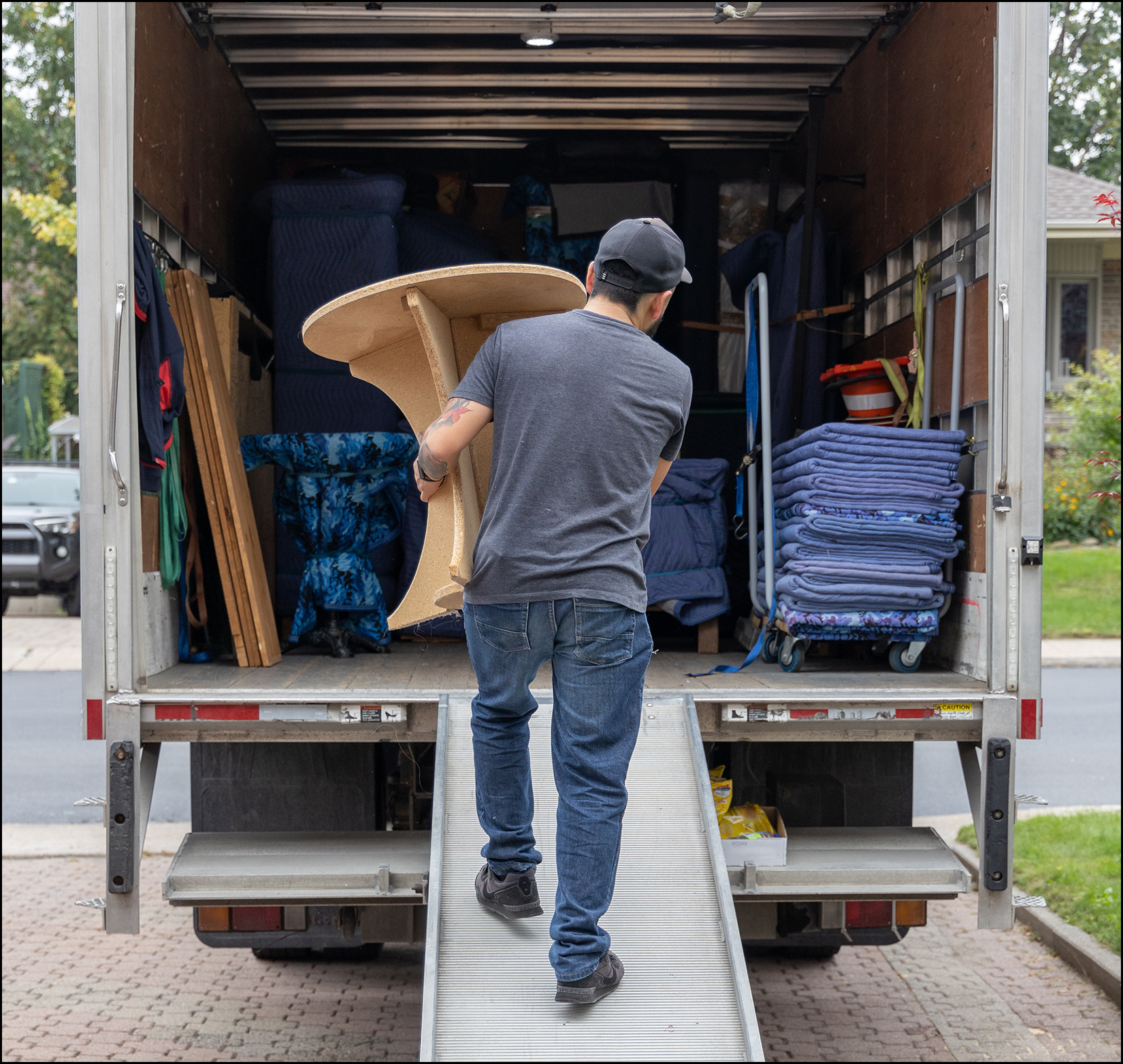 So, you're getting ready to sell your home... but you're also buying a home... and you're wondering how this will all work out if you have to be out of one house by the closing date and can't move into the new house until that same closing date. Indeed, a good question. I'll start by pointing out that... Most Buyers Will Want You To Move Out Of Your Home By The Closing Date It's certainly possible that some buyers for your home might be willing to let you rent back for a few days or even a few weeks after closing... but that isn't likely to be most of the buyers. Most buyers will actually want to have access to the house as of the closing date... and will want you to be out of there at that time. Given that most buyers will want you to have moved out of the house by the closing date, what is a seller/buyer to do? The typical options would be... 1. Ask your buyer again, really, really nicely, if they'd let you stay in the house for a few days (or more) after closing. 2. Ask the seller of the home you are buying if they would let you move into the new house a few days (or more) before closing. 3. Move everything out of your current house and into a moving truck the day before closing, close the following day, move everything into your new house later in the day on the closing day. Yes, stressful. 4. Move out of your house, put things in storage, move into your new home a few days or weeks later depending on when that closing take place. Etc., etc., etc. Point being... you can't necessarily assume, as a seller, that you will be able to stay in your home any later than the closing date for the sale of that home. It will be awesome, of course, if a buyer will allow you to stay in the house after closing, but don't expect it or count on it. | |
Every Home Seller Must Find The Appropriate Balance Between Optimal Preparation And Optimal Timing |
|
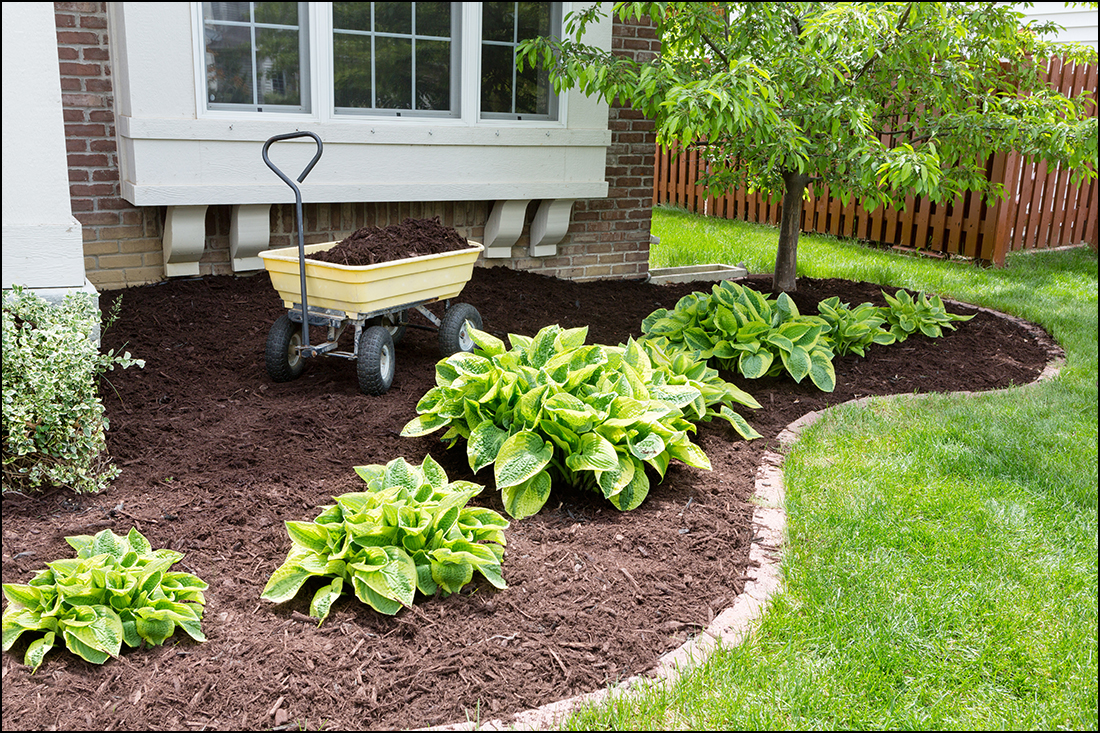 Some homes need more preparation than others before they would be ready to go on the market -- but there is always something that could be done. Whether it is a bit of painting, or rearranging, or de-cluttering, or mulching, or repairing, there are almost always preparations that can be undertaken in order to best prepare your house for the market. But... most home sellers don't have an infinite amount of time (or money) to make those preparations prior to listing their homes for sale... depending on quickly they hope to have their home on the market for sale. As such... Every Home Seller Must Find The Appropriate Balance Between Optimal Preparation And Optimal Timing If you want to move sometime in the next few months, but you're not in much of a hurry at all... you might prioritize the preparations of your home, going a bit further than some sellers to make sure everything is "just so" before photos are taken and your house hits the market. If you want to have your house under contract as quickly as possible, preferably yesterday, then you might optimize timing, and get your house on the market sooner rather than later instead of continuing to make further updates to your home. As or after we walk through your home together, we will discuss both the preparations you might make... and your ideal timeframe for having your house on the market... to try to find an appropriate balance between these two priorities. | |
Will The Unique Features Of Your Home Broaden Or Narrow The Buyer Pool? |
|
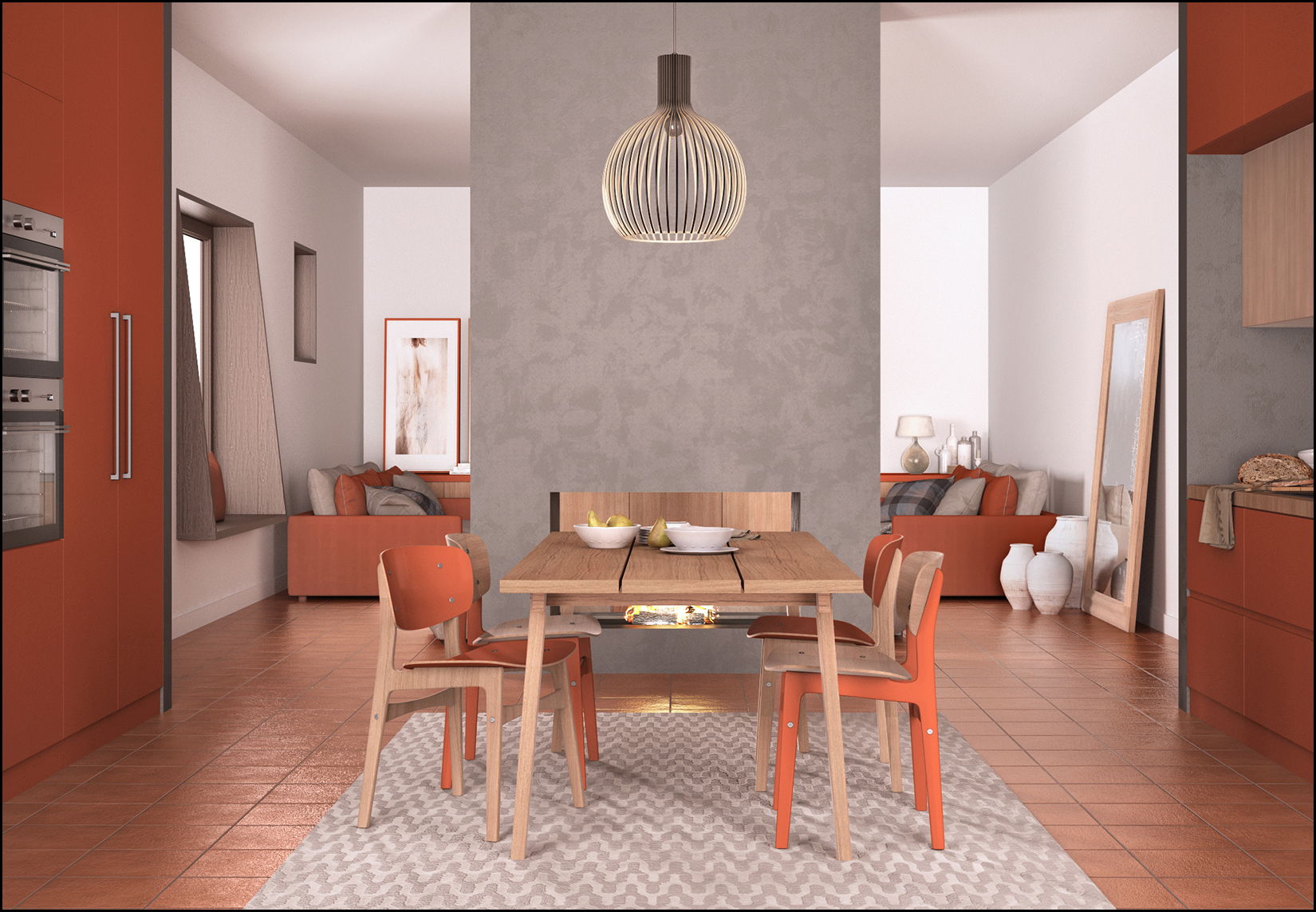 When you are getting ready to sell your home, we'll need to think about how large the pool of buyers will be who will consider your home. Clearly, the more buyers who can and will consider your home, the better. A variety of aspects of your home will limit the size of that pool of potential buyers for predictable reasons...
But then, we get to the more unique features of your home... some such features will broaden the buyer pool... and some might narrow it. For example... Every bedroom has it's own bathroom - this would likely broaden the pool of buyers who will consider your home. Custom tile flooring throughout with a bold color palette - this might narrow the pool of buyers. Screened porch and deck and two patios - this would probably broaden the pool of buyers. Elaborate landscaping - this might narrow the pool of buyers if they worry about landscaping maintenance The list could go on and on. Let's make sure to evaluate how large of a pool of buyers be willing to consider your home based on it's relatively routine... and more unique... features. | |
Sometimes One Offer Spurs On Additional Offers |
|
 This dynamic is common with brand new listings and listings that have been on the market for a few weeks. Brand New Listing... Eight showings over the first three days, but no offers. Then, an offer is received, other showing agents are notified, and three more offers are submitted. Few Week Old Listing... Nine showings over the first three weeks, but no offers. Then, an offer is received, other showing agents are notified, and two more offers are submitted. It's almost as if some buyers need to know other people want to buy a house before they are willing to decide they want to buy the house. So... Sellers - Don't despair if you don't have an offer yet - when an offer comes in, it could actually result in more than one offer. Buyers - Who will you be? The first buyer to make an offer, or will you wait until someone else does and then jump in? | |
Contract Activity Cools Slightly After Strong Summer Surge in Home Sales in Harrisonburg and Rockingham County |
|
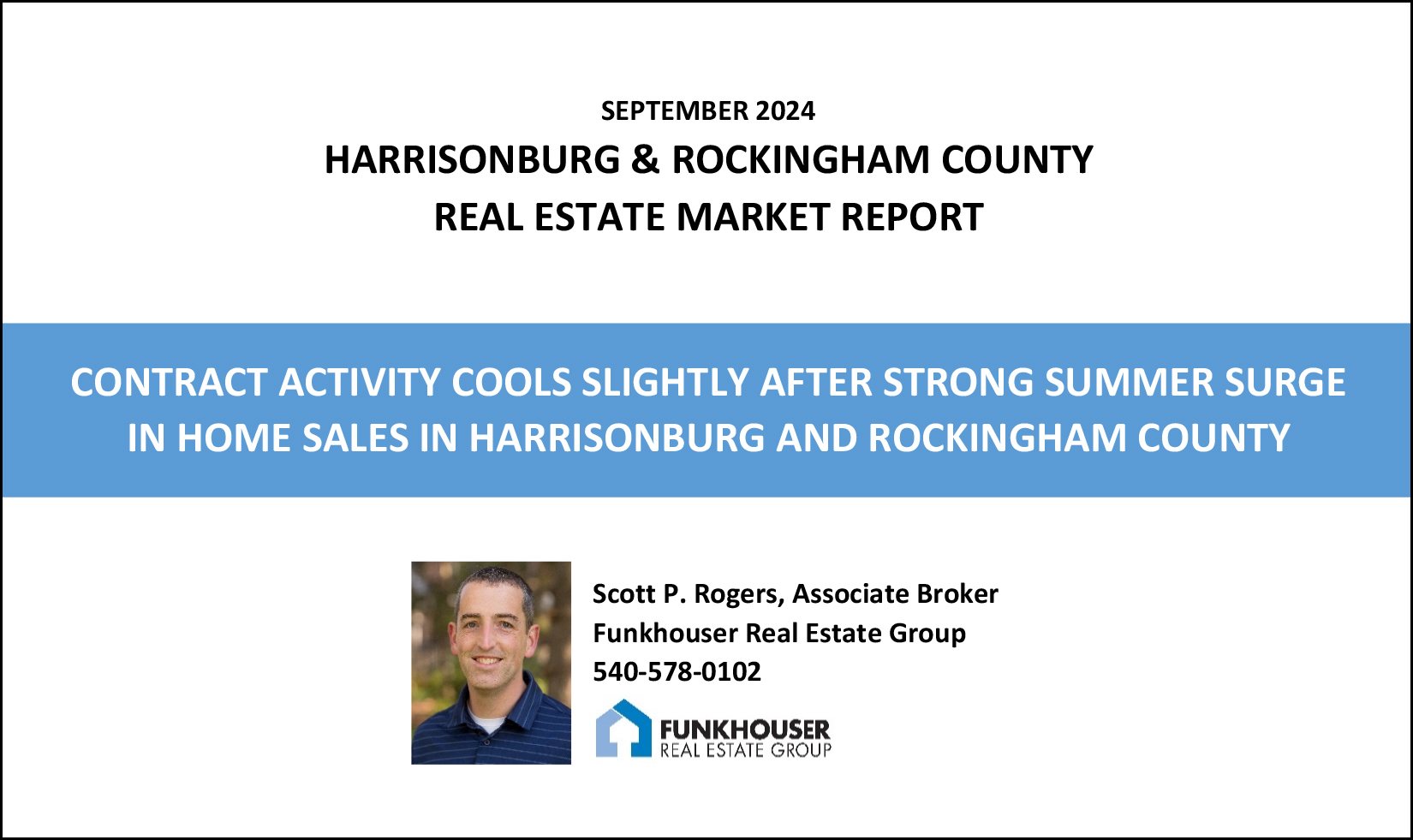 Happy Monday Morning, Friends! We are just six days from the first day of Fall... and it's starting to feel like it! High temperatures are peaking in the 70's instead of the 80's this week... the leaves are starting to change colors... and we're back to having fun watching JMU football games... 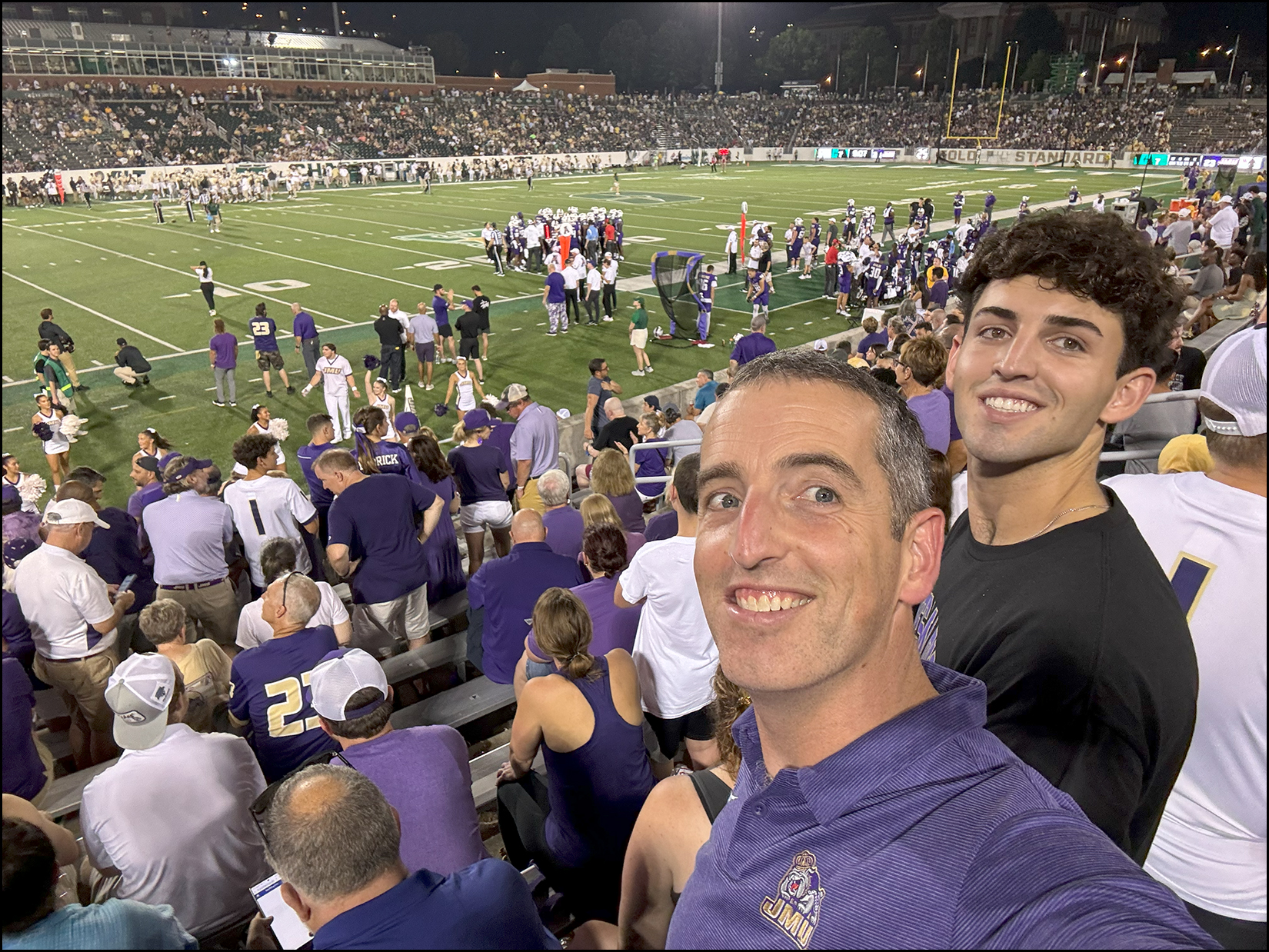 My niece, Sofia, just started college at UNC Charlotte, so Luke and I were excited to go down to visit her and to take in the first JMU football game of the season. Here's looking forward to some further fun as the season continues! Go Dukes!!! Before we dive into the real estate data... as one last reminder of summer... I'm giving away a $50 gift card to Sweet Frog. Yes, I know, we can enjoy Sweet Frog all year round, but it's particularly tasty on a warm summer evening. So, if you're a fan of Sweet Frog frozen yogurt (and all the toppings!) click here to enter the gift card. And now, on to the latest in our local real estate market... 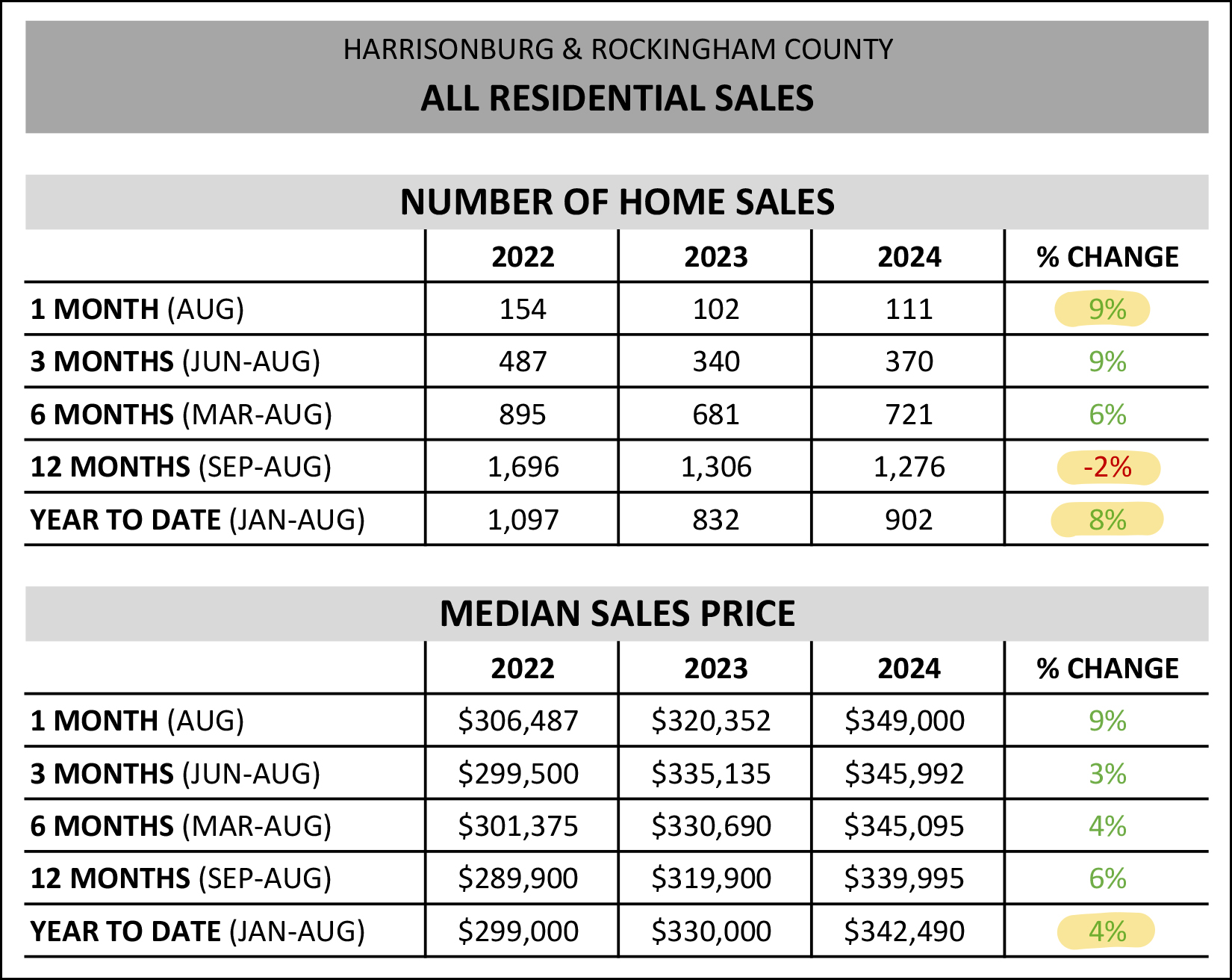 Above you'll see a basic overview of the amount of homes that are selling these days, and the prices at which they are selling. A few things to note... # Sales: We saw more home sales this August than last (+9%) and even though we've seen fewer home sales over the past 12 months compared to the prior 12 months (-2%) we are seeing an increase (+8%) in the first eight months of 2024 as compared to the same timeframe last year. So... more homes are selling this year than sold last year, and... Prices: In every time horizon I explored above (1M, 3M, 6M, 12M, YTD) I found an increase in the median sales price. I'll focus in on the year to date number, however, where we see a 4% increase in the median sales price when looking at homes selling in the first eight months of this year (median of $342,490) compared to the first eight months of last year (median of $330,000). As we continue, we'll want to see how the performance of different market segments compare to this market wide 4% increase in the median sales price. First up, detached home sales... 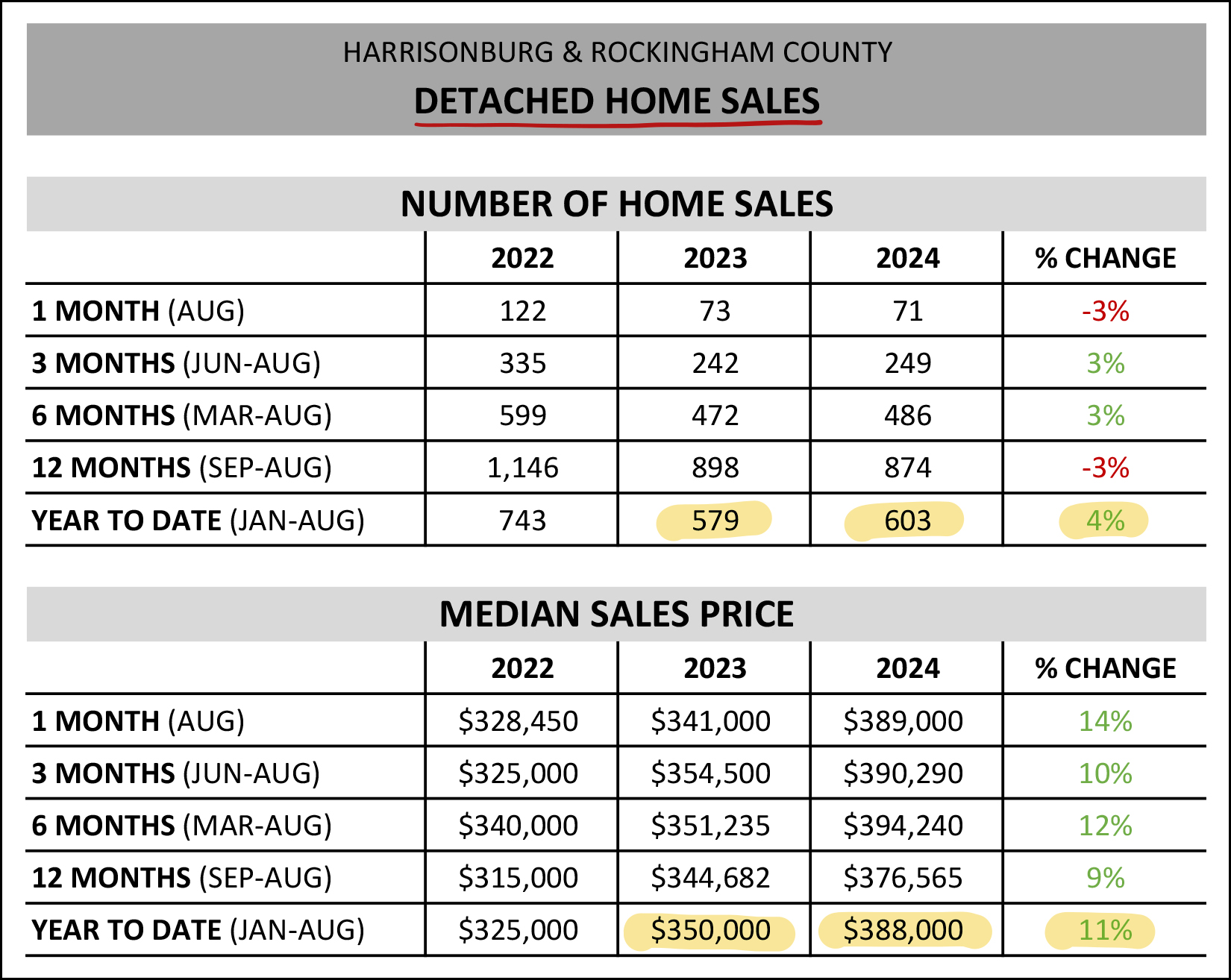 Interestingly... [1] Despite an 8% market-wide increase in home sales thus far in 2024... we're only seeing a 4% increase in the number of detached homes that are selling. [2] Despite only a 4% increase in the median sales price in the overall market (detached + attached) we're actually seeing an 11% increase in the median sales price of detached homes in 2024. As we continue through this report, you'll note a variety of charts and graphs that indicate that price growth is slowing to only 4%... but that is the overall market, whereas detached home median sales prices still seem to be climbing more quickly than the overall market. Dialing in now on one specific geographic area... the City of Harrisonburg... 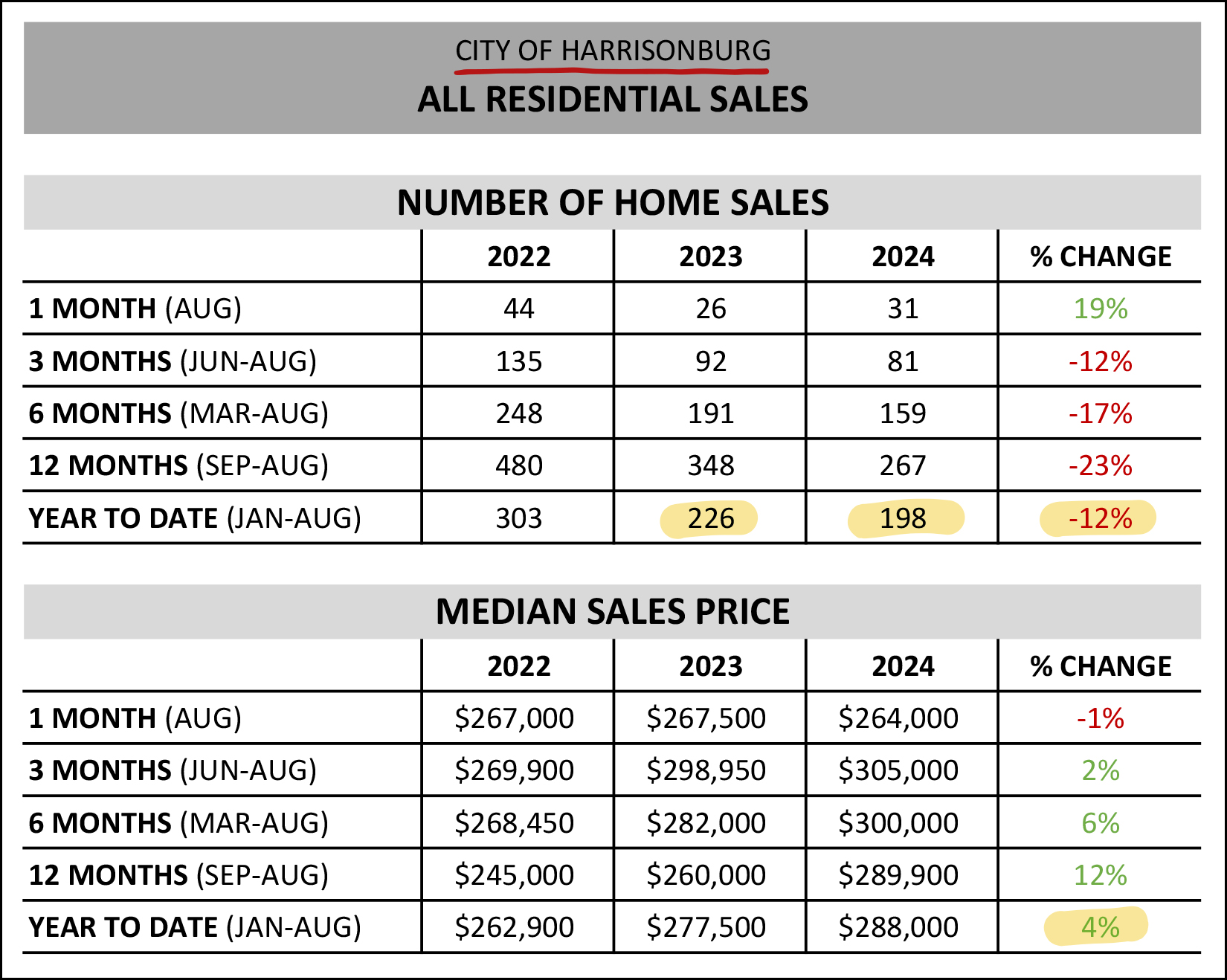 It has been increasingly difficult to find a house to buy in the City of Harrisonburg. As shown above, in the first eight months of 2022 we saw 303 home sales in the City, last year that dropped to 226 sales and this year only 198 sales. To be clear... this is almost entirely a supply side issue - there aren't enough property owners willing to sell their homes, and there isn't much new construction happening in the City these days. Despite that restriction in the market in the City of Harrisonburg, we are still seeing only a 4% increase in the median sales price when comparing the first eight months of this year to the first eight months of last year... and the median sales price in the City of Harrisonburg is still under $300K thus far in 2024. And how about out in Rockingham County? How are things going there? 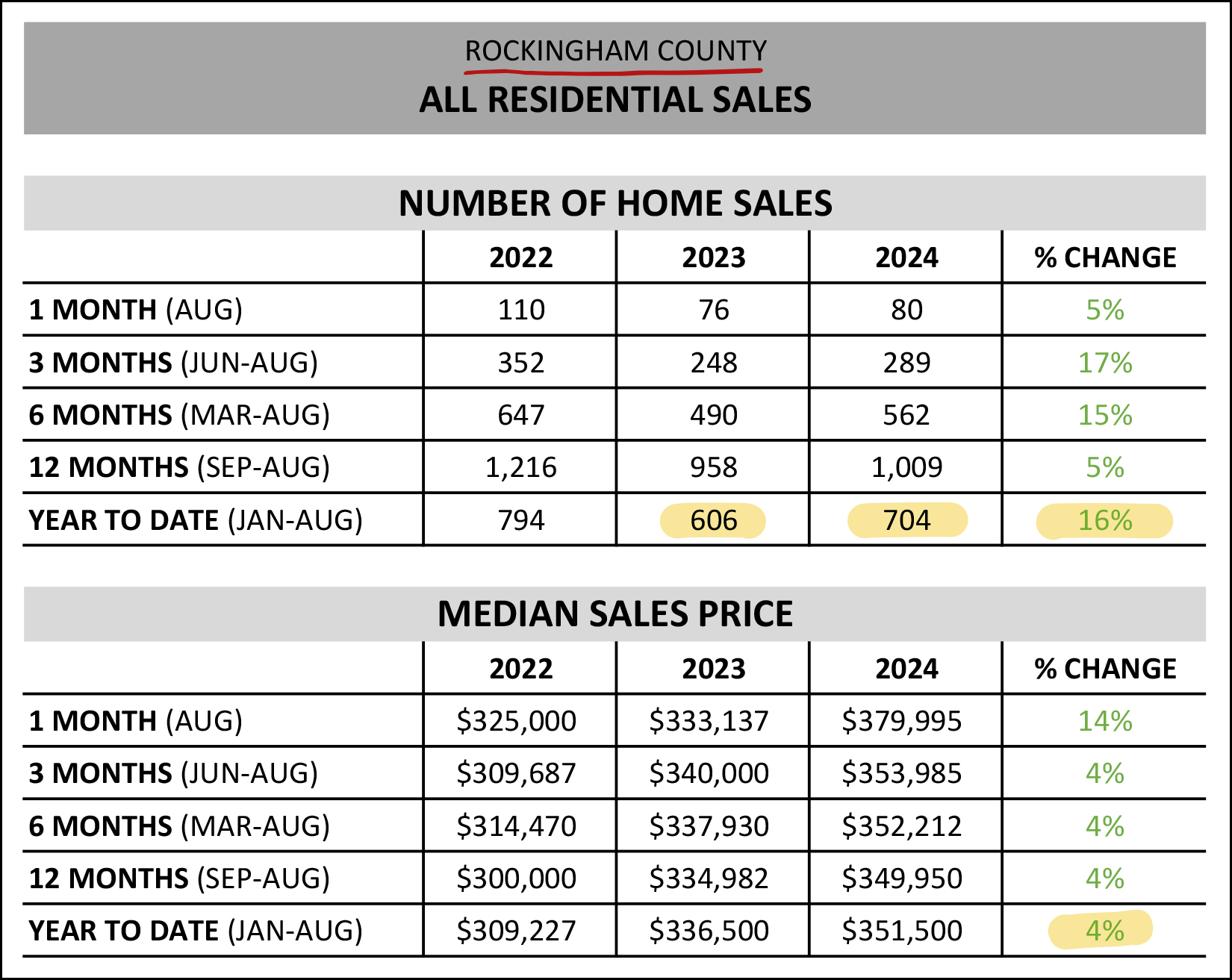 We are seeing a significant increase (+16%) in the number of homes selling in Rockingham County thus far in 2024 compared to in the same timeframe in 2023. You can't see it from the chart above, but a lot of that increase in the number of homes selling is a result of new homes being built in the County. Median prices, however, continue to rise in Rockingham County at that same 4% in the first eight months of 2024 compared to the same timeframe last year. New home construction... it's on the rise? Yes, indeed, it is... 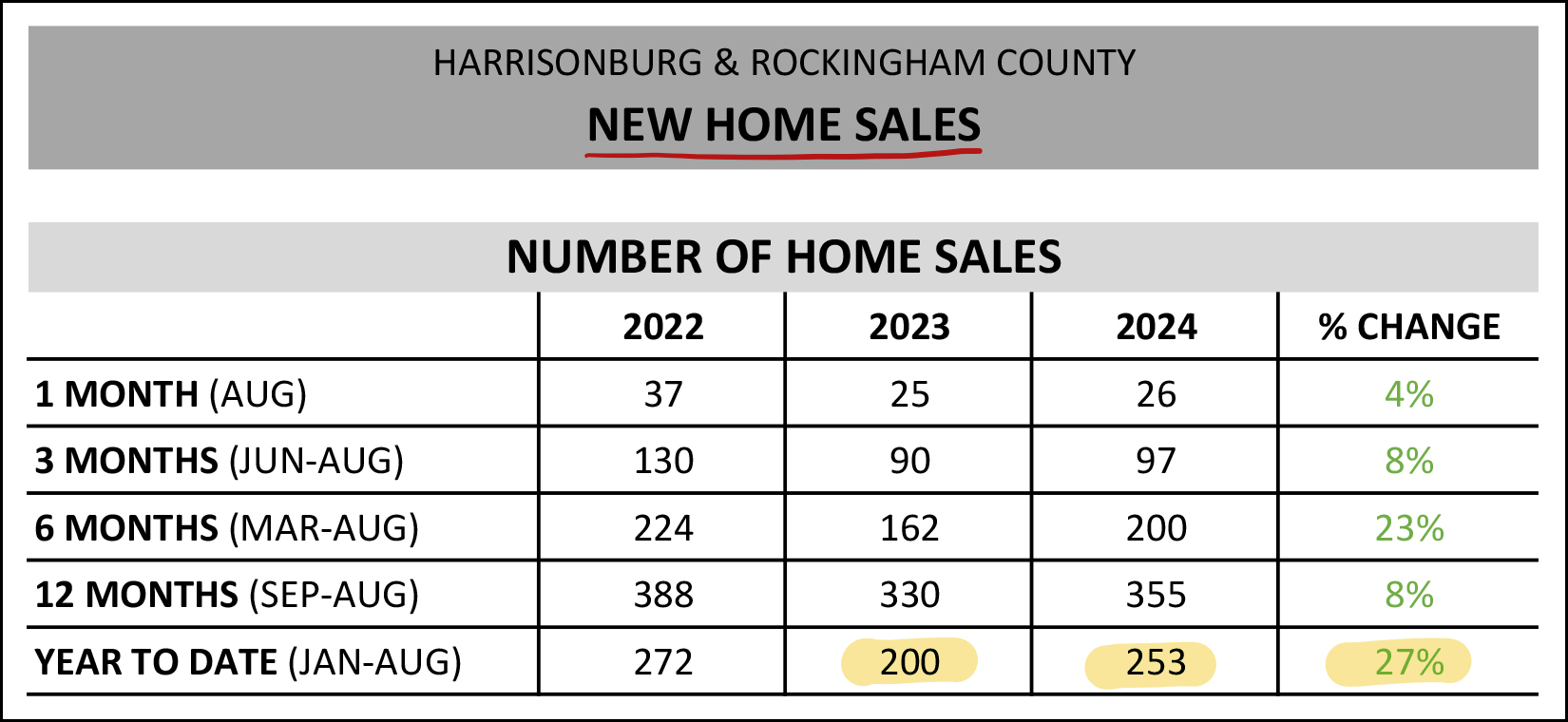 We've seen 253 new home sales thus far in 2024... which is a 27% increase from the first eight months of 2023... though interesting, it's slightly fewer than we saw two years ago, in 2022. I expect we will continue to see quite a bit of new home construction over the next few years... and we need it... as we continue to see high levels of demand from home buyers. So, if we're seeing a 27% increase in new home sales, how about those existing home sales? Are they also increasing at that pace? Ummm... nope... 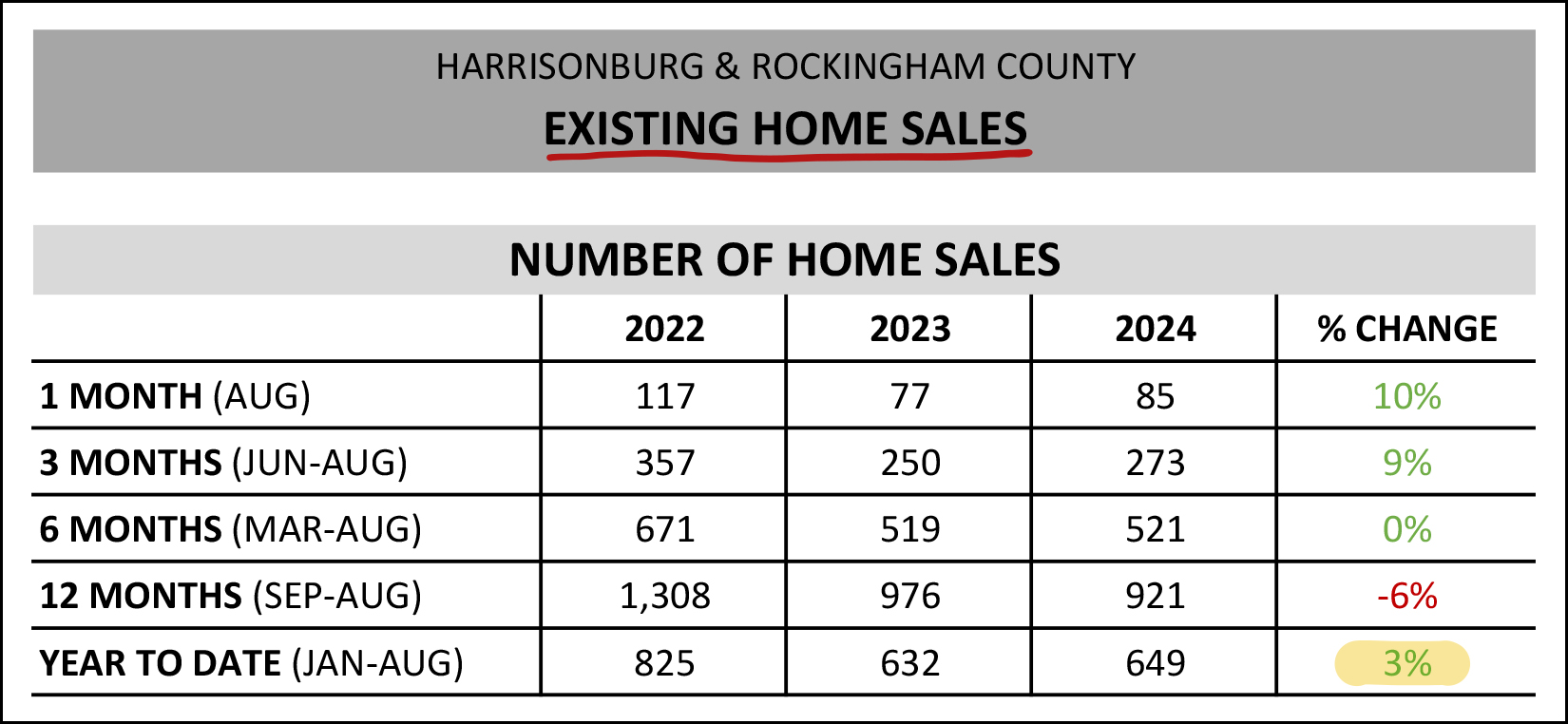 In contrast to the 27% increase in new home sales thus far in 2024... we have only seen a 3% increase in existing home sales. Lots and lots of homeowners are just staying put and not selling their homes. Now, let's get to some of the graphs, to get a clearer picture of some of the trends we have been discussing... 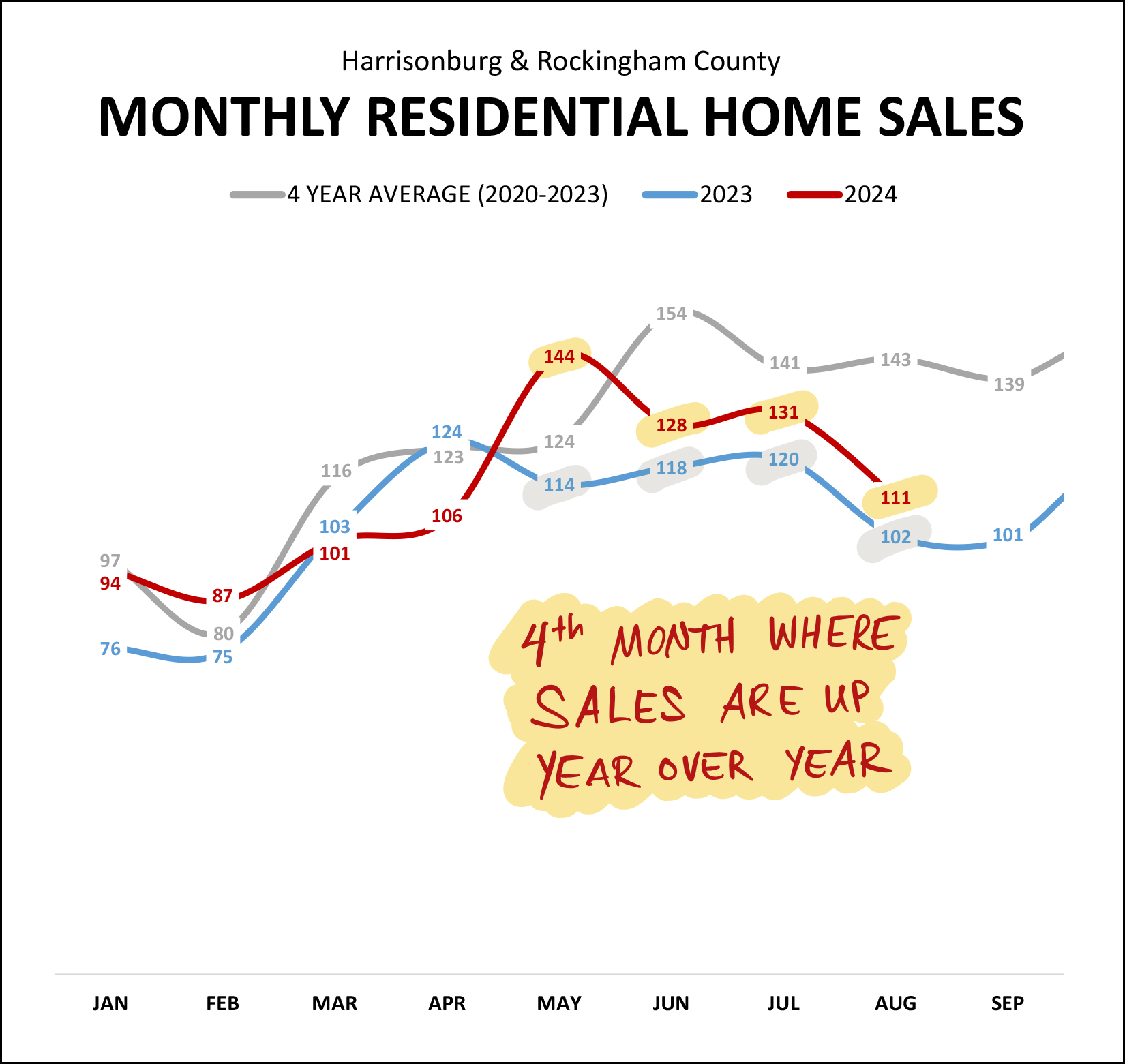 August marks the fourth month in a row with more home sales (closed home sales) than during the same month last year. This has been an active summer of real estate closings... though homes often go under contract a month or two before they make it to closing... so this busy summer of real estate closings was the result of a busy late Spring and early Summer of contracts, which we'll see shortly. To put this year in the context of the past two years... 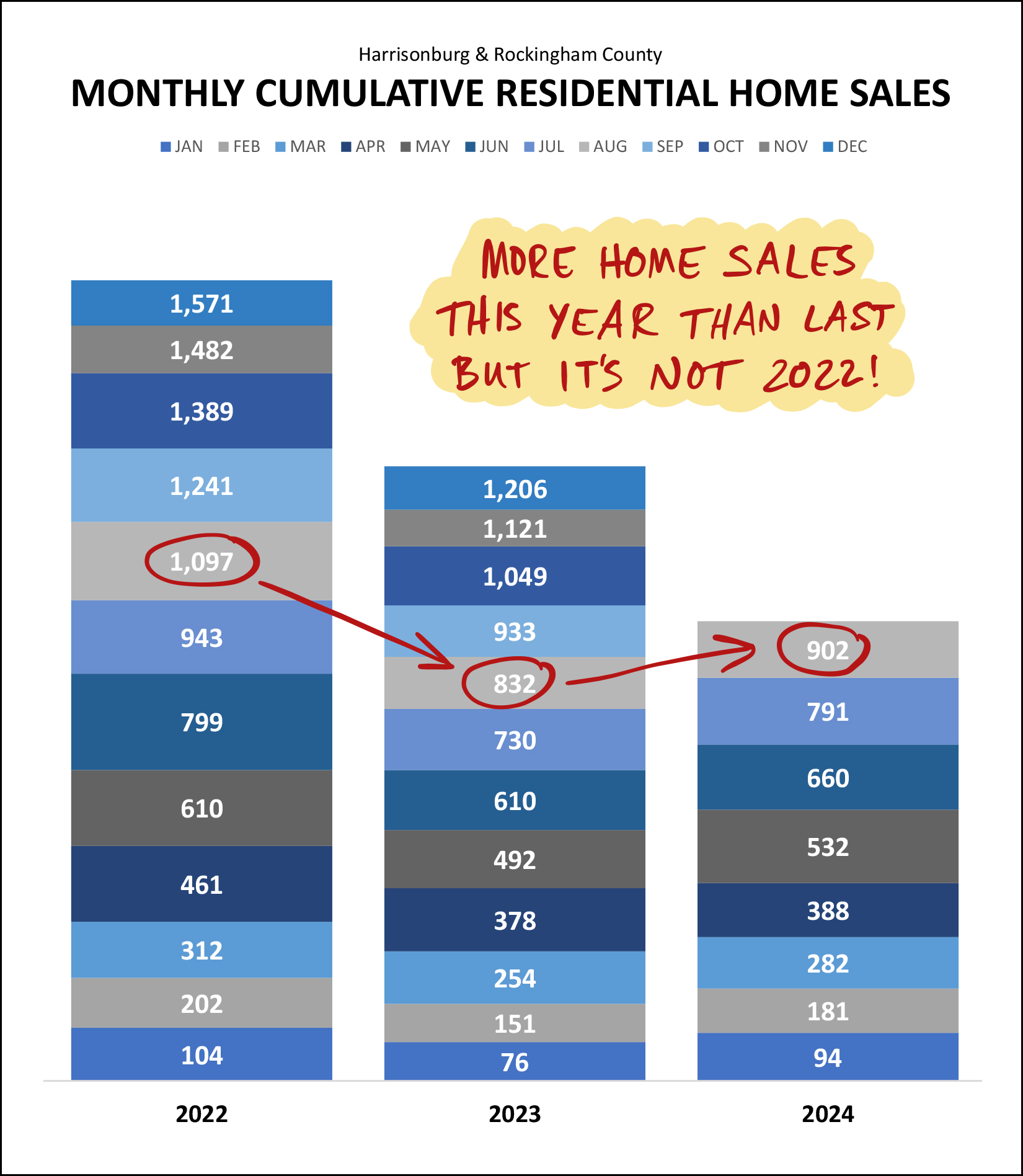 Home sales in 2024 are definitely exceeding 2023 levels... but pale in comparison to 2022. I expect we might see some further upward momentum in home sales later in 2024 if or when we see further relief in mortgage interest rates. More on that later. Here is an illustration of the two overall trends we're seeing right now in Harrisonburg and Rockingham County... 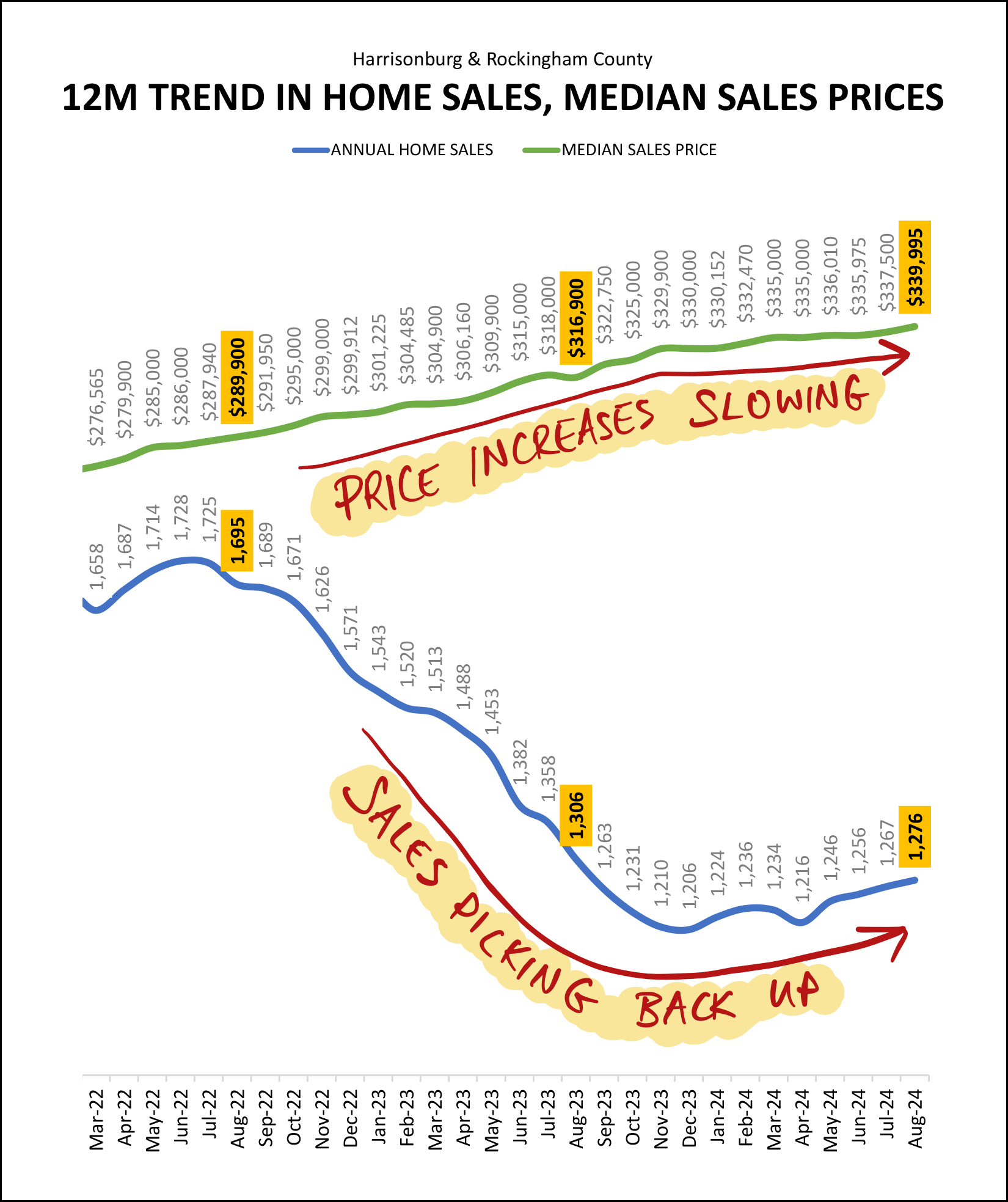 First off, at the top, home price growth is slowing. Testing your reading comprehension and short term memory... do you recall that the overall market is seeing only a ___% increase in the median sales price while the detached home segment of the market is seeing an ___% increase in the median sales price? ;-) Overall Market = 4% increase; Detached Homes = 11% increase. And... that second line (the blue one) at the bottom... shows us that aver steady declines from over 1,700 sales a year down to about 1,200 sales a year, we are now seeing some overall increases in the number of homes selling in our market. Back to those detached homes for a moment... 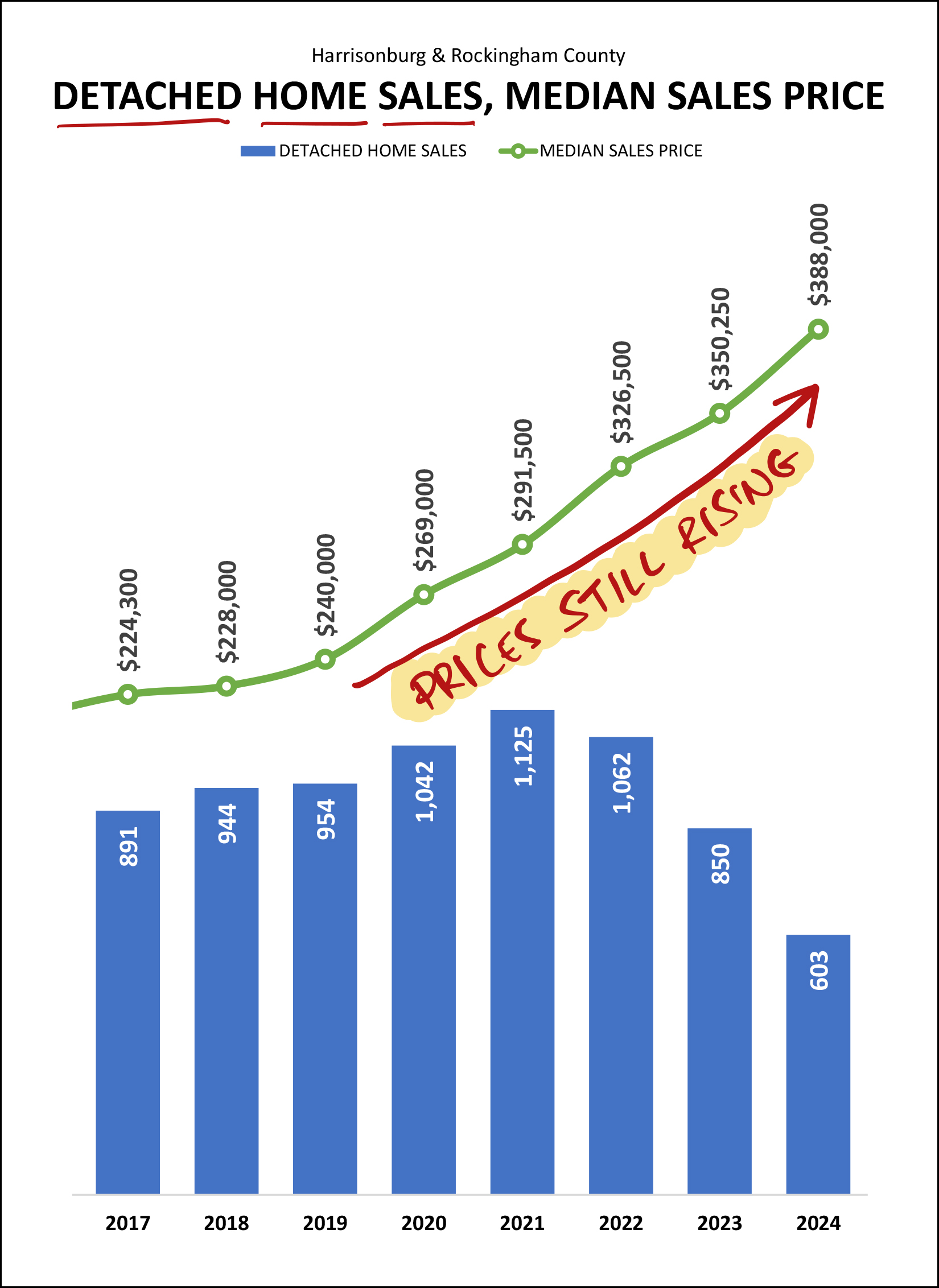 Here's you'll note the *absence* of a flattening out of the median sales price line in green. While the overall market is only seeing a 4% increase in median sales prices in 2024, thus far this year detached homes have been selling at prices that are 11% higher than last year. Earlier I talked about a busy summer of closings which was a result of earlier contract activity. This next graph shows current contract activity, which is a predictor of home sales activity over the next month or two... 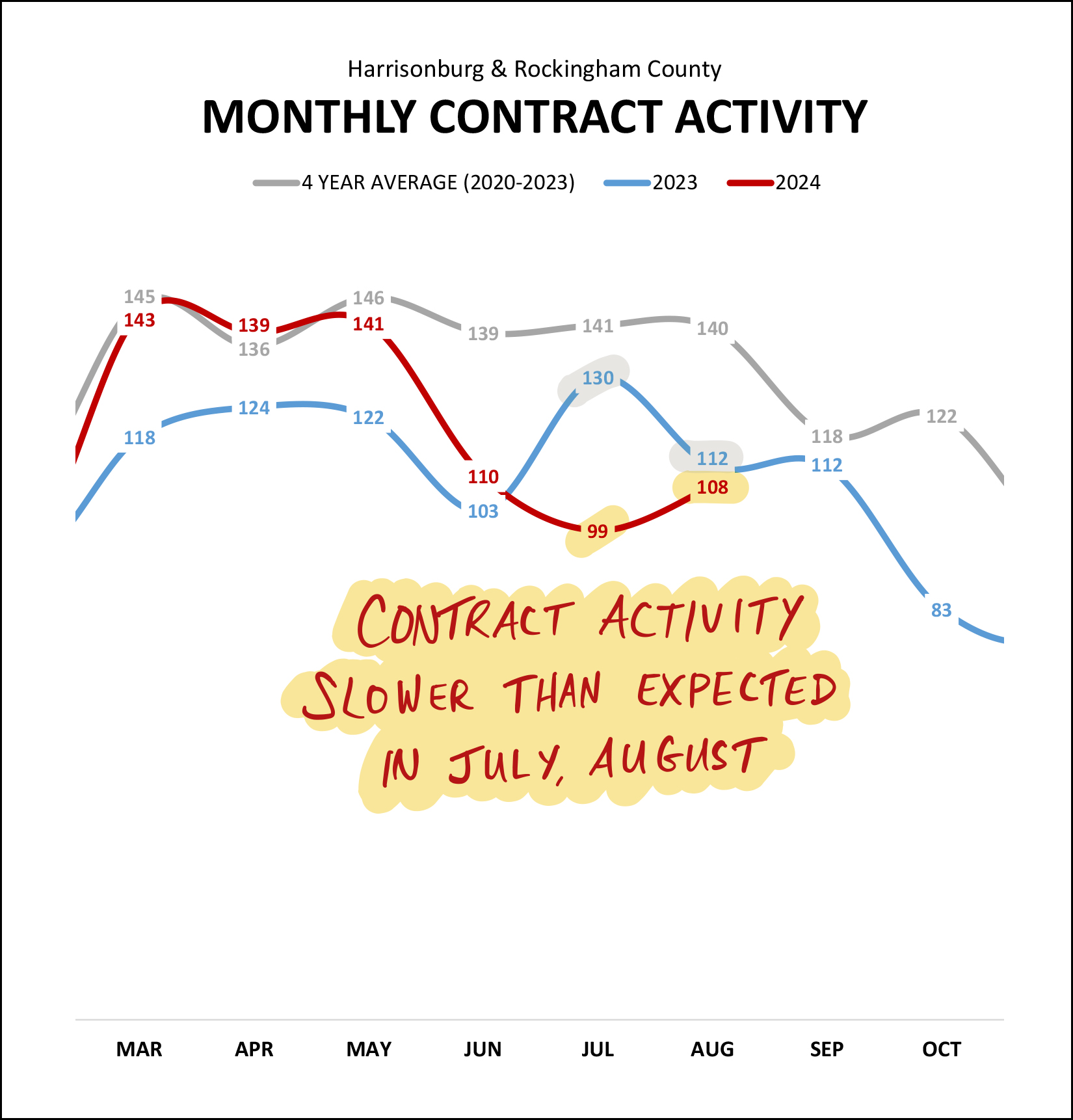 On the left side of the graph above you can see quite a few months of much higher contract activity this year (red line) than last year (blue line) -- particularly in March, April and May. But then, contract activity declined in July and August to levels below where we were a year ago. Looking ahead, we will most likely see a similar number of homes going under contract in September as we did in August, before contract activity likely starts to decline even further in October. This recent slow down in contract activity has also shown up in the pending sales metric, which tracks how many homes are under contract at any given point... 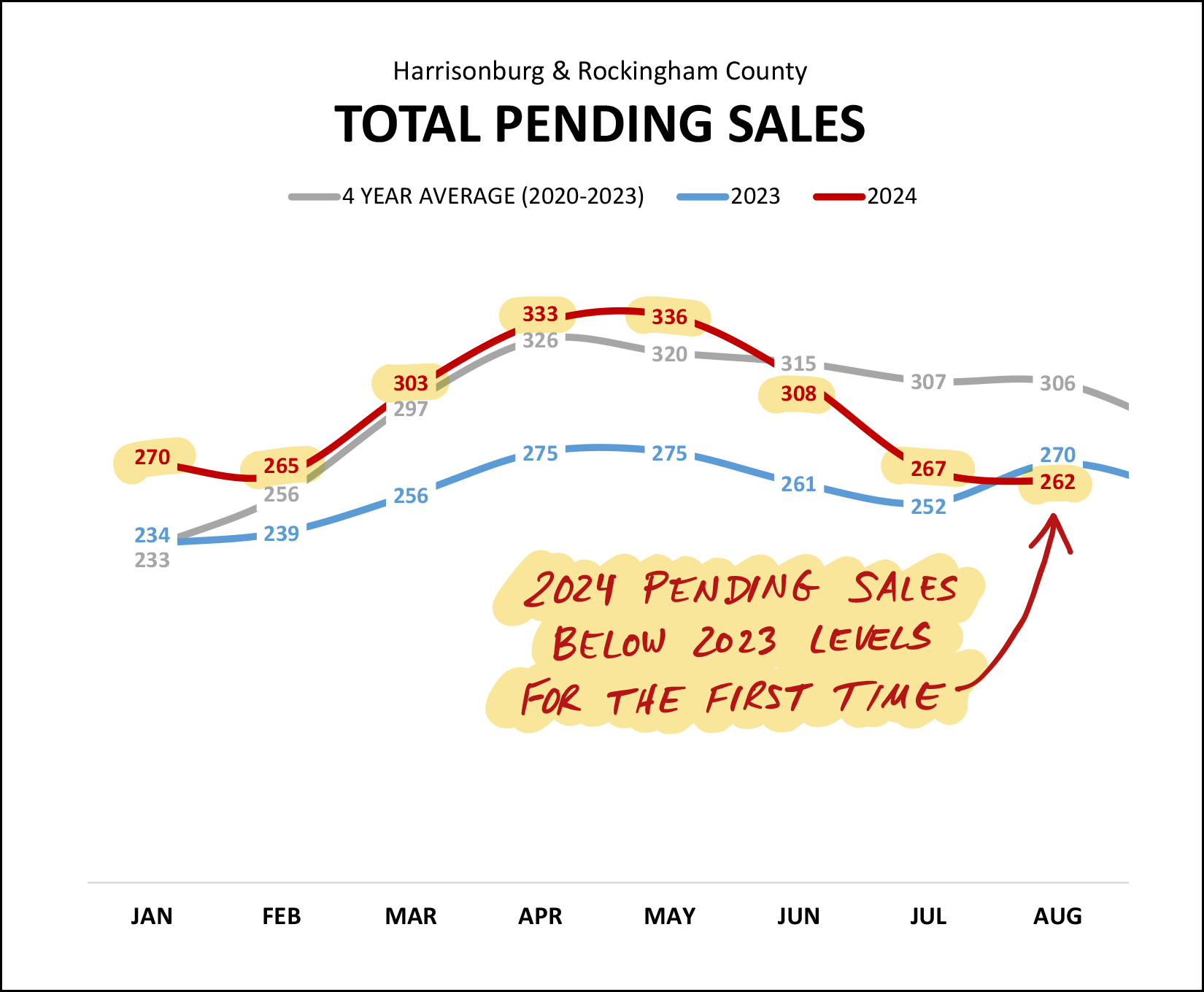 After seven months of riding high above 2023 levels, we have now seen pending sales drop below 2023 levels in August. This is mostly a result of slower months of contract activity in July and August. It's certainly possible that we'll see pending sales pop back up again as we work our way through September and October... but the 2023 and 2024 trajectories have crossed as of the end of August. But wait... if pending sales are declining, that must mean inventory is rising? 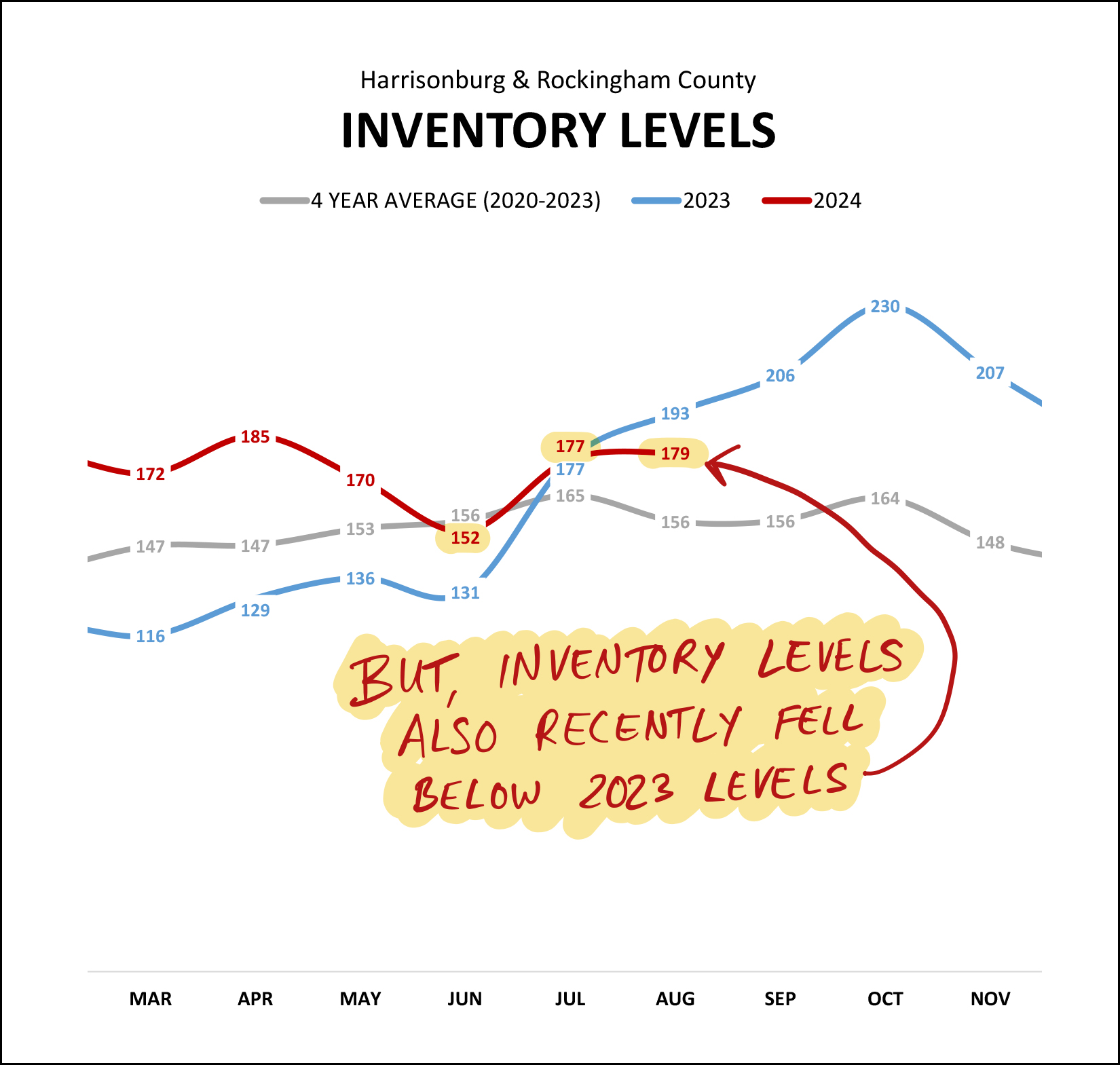 Sorta kinda. Inventory levels dropped to their lowest levels at the end of June... but rose again in July and remained steady at that point in August. Of note... inventory levels consistently climbed last year between June and October... but that was during the exact same timeframe when mortgage interest rates were climbing to their highest levels in 20 years. I do not expect that we will see inventory levels climb that high in September and October this year. But speaking of climbing... will days on market start to climb soon? 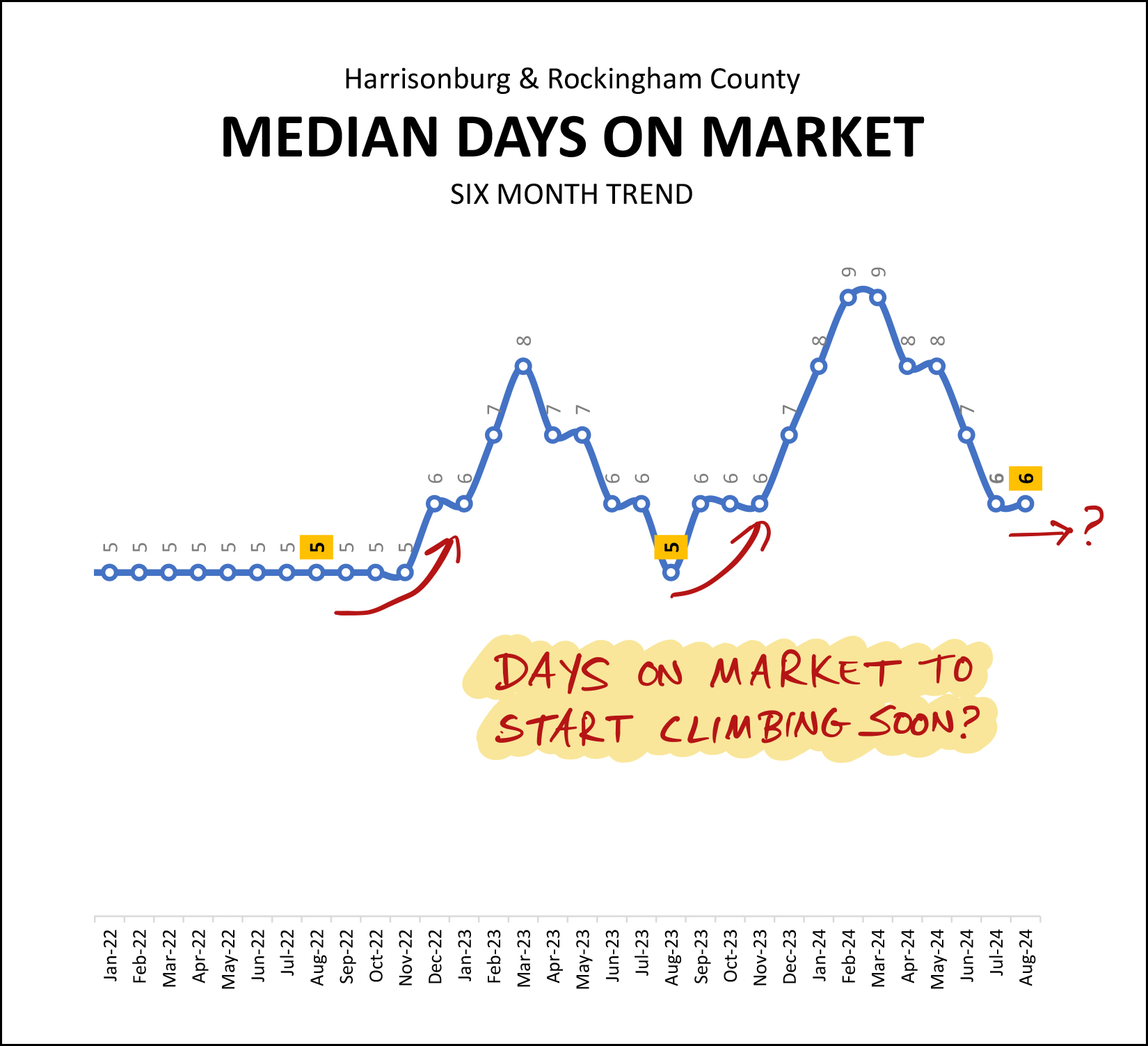 After quite a few years of absurdly, consistently low median days on market, we have seen some variability in this metric over the past two years. That pace at which homes go under contract (days on market) slowed during each of the past fall/winter seasons, so perhaps we'll start seeing that again in 2024. Finally, that one little (or big) number that seems to have been having an oversized impact on the housing market over the past few years... mortgage interest rates... 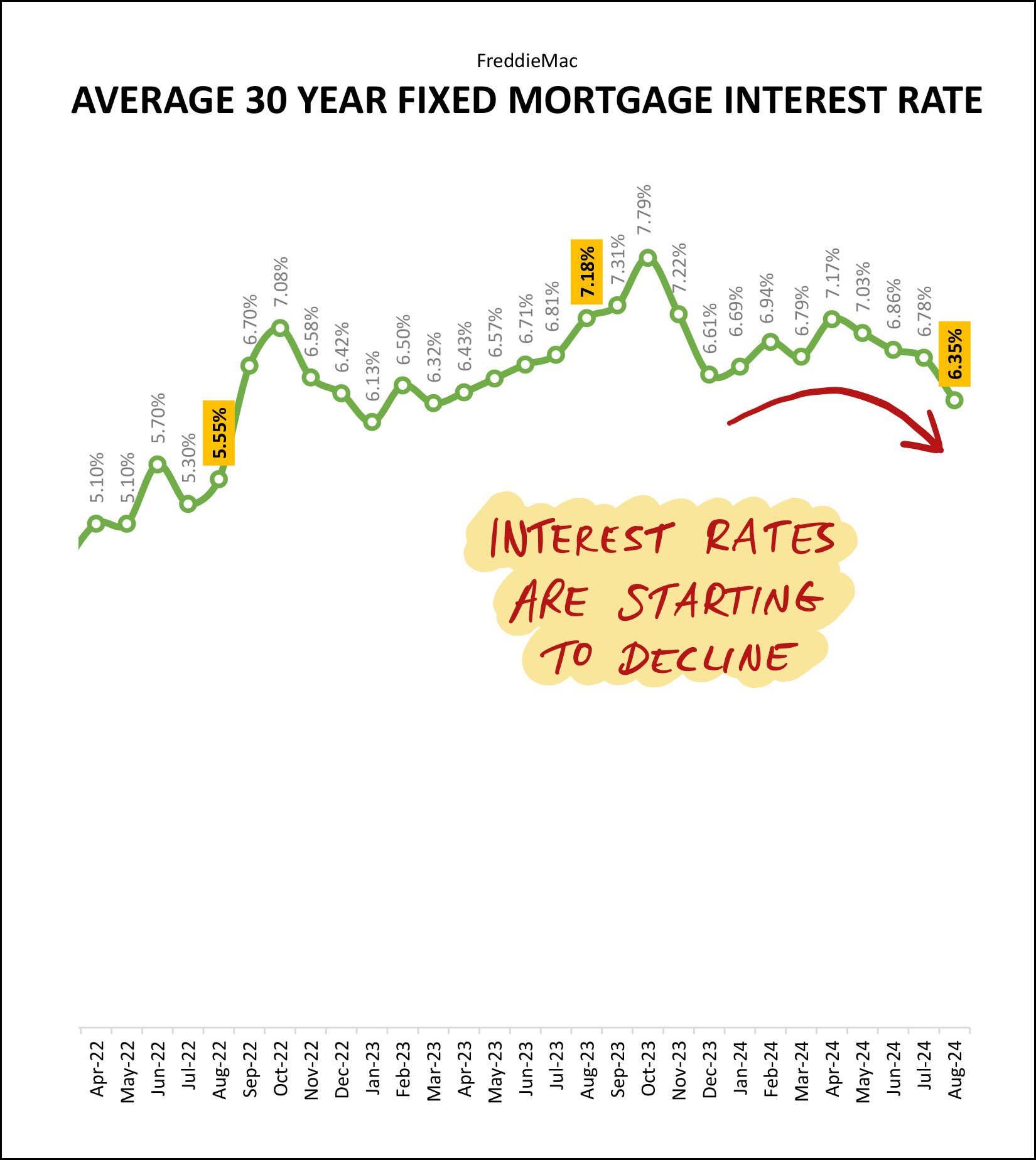 After peaking at 7.79% last October (the highest level in 20+ years) we have started to see some relief in mortgage interest rates -- particularly over the past three to six months. As of June, the average 30 year fixed rate mortgage had fallen below 7%, and now we're closer to 6% than 7%. The Federal Reserve might be announcing a rate cut this Wednesday... though some say that the recent anticipation of that rate cut has already been priced into adjustments in mortgage interest rates. So, let's play a bit of up and down in 2024...
So, as we look ahead at the final three and a half months of the year (yes, that's all that remains) here are a few things to keep in mind... Home Buyers - Many segments of the local market are still rather competitive (multiple offers) but plenty of homes aren't going under contract within two days. Get preapproved now, go see houses quickly when they hit the market, and be prepared to make a rapid, but thoughtful decision about whether to make an offer. Home Sellers - Some, but not all, houses are going under contract quickly. The more broadly appealing your home is to buyers (based on size, location, house features, lot features, etc.) the more quickly we are likely to receive offers. If there are some attributes of your home that disqualify broad segments of the pool of potential buyers, then we are likely to have a longer wait for an offer... and we might have to adjust your list price more than the market data would otherwise suggest in order to inspire a buyer to make an offer. The data and observations I have presented in this market report are a high level overview of our overall market. If you're getting ready to buy or thinking about selling, we should be chatting more specifically about your segment of the market -- what you will be buying, or selling. Feel free to reach out anytime with questions or to set up a time to meet. You can contact me most easily by phone/text at 540-578-0102 or by email here. | |
Most Listing Have A First Round Of Showings Followed By A Slower Pace Of Showings Over Time |
|
 We are no longer in a real estate market where EVERY home will go under contract VERY, VERY quickly. That was the case for a few years, but it's not now. Thus, while some homes do go under contract very quickly, some do not. And for those that do not go under contract quickly we find this to be true... Most Listing Have A First Round Of Showings Followed By A Slower Pace Of Showings Over Time Within the first week of your home being on the market you will likely see more showings than you'll have any other week that your home is on the market. That first week is all (or most) of the buyers who have been in the market to buy for some time, who haven't yet found what they are looking for in a home. But after that first week passes, and all of the current buyers in your market segment have come to see your home, we will then be in the marketing and waiting and marketing and waiting stage of selling your home. We will be attempting to reach new prospective buyers with our marketing efforts... and we will be waiting for new buyers to enter the market ready to buy. So... if your house is going on the market soon, know that you'll likely have a good amount of showings in the first week... but then that the showings will slow down quite a bit in the weeks that follow. | |
When Is A Home Seller Likely To Consider Your Home Sale Contingency? |
|
 So, you have a home to sell before you can buy your next home... and you are not able to arrange financing to be able to buy before selling? Let's think through when a seller is likely to consider -- or not consider -- your home sale contingency. 1. If your home is not yet on the market for sale, and a house you want to buy was just listed and has lots of showings and talk of offers -- the seller is not likely to consider your offer with a home sale contingency. 2. If your home is listed for sale, and under contract, and a house you want to buy was just listed and has lots of showings and talk of offers -- the seller might be willing to consider your offer with a home sale contingency, if they don't receive (or think they will receive) an offer without such a contingency. 3. If your home it not yet on the market for sale, but the house you want to buy has been on the market for a few months without going under contract -- the seller might just be willing to consider your offer with a home sale contingency to give you time to hopefully secure a contract on your home as well to be able to proceed towards closing. So... whether a home seller will accept your home sale contingency is related to whether your house is already listed for sale, and if your house is already under contract, and whether the house you want to buy is a recent listing and whether the house you want to buy has lots of other competing buyer interest. So, it's not impossible to buy a home with a home sale contingency -- but it won't allow you to successfully pursue every house that you might want to buy. | |
If You Can Buy A House Before Selling Your Current House, Consider Keeping Your Current House As A Rental Property |
|
 This isn't universally applicable advice for all homeowners who are selling and buying, but it's worth considering if you find yourself in this situation... If You Can Buy A House Before Selling Your Current House, Consider Keeping Your Current House As A Rental Property Here's what I mean and why... You might already be a homeowner... but find yourself ready to buy a new home. You might be considering selling the current home and buying a new one for a variety of reasons -- to get to a larger house, or a smaller one, or one with different rooms in different places, or to move to a new school district, and on and on. If you are in this situation... of getting ready to sell and then buy... you'll likely want to explore whether you have the financial capability to buy before you sell. After all, your offer to buy a house will look much more compelling to a seller if you do not have a home sale contingency in that offer. And thus, if you talk to your lender and find out that you can buy before you sell, it is often then reasonable to stop and consider whether you could buy... and then not sell at all! If you buy a new home and then do NOT sell your current home... 1. You can rent your current home, often for more or much more than your current mortgage payment. 2. You can put your excess rental income towards your new mortgage payment, while also putting some aside for maintenance costs on the house you are keeping. 3. The rental rate on the house you keep will likely continue to increase over time. 4. Your tenants will be paying down your mortgage on the home you kept instead of selling. 5. Over the long term, you will own two houses that are appreciating in value, rather than just one. There are plenty of reasons why you might not keep the house you are selling... because you don't want to be a landlord, or you don't like the larger financial risk, or you are moving out of the area... but if you can buy before selling, let's talk the "keeping the house" idea through before you commit to selling your current house. | |
Would You Sell Your Home If You Do Not Know What You Will Buy? |
|
 For most folks, the answer is no... ...they would not sell their home if they do not yet know what they will buy. And, since there are still currently more buyers in the market than sellers... it likely makes sense to ensure you have a solid plan for what you will buy before you start down the path to selling. Otherwise... we might get your house on the market, get excited about quite a few showings, be thrilled about receiving several offers with highly favorable terms... only to realize that you aren't actually ready to commit to selling your home if you don't have a new home to purchase. So... if you're ready to move from one house to the next... let's make sure we're confident that we can sell your current home... but we might need to start by focusing on what you will buy... before starting the process of selling your current home. | |
Can Your Current Home Grow With You? |
|
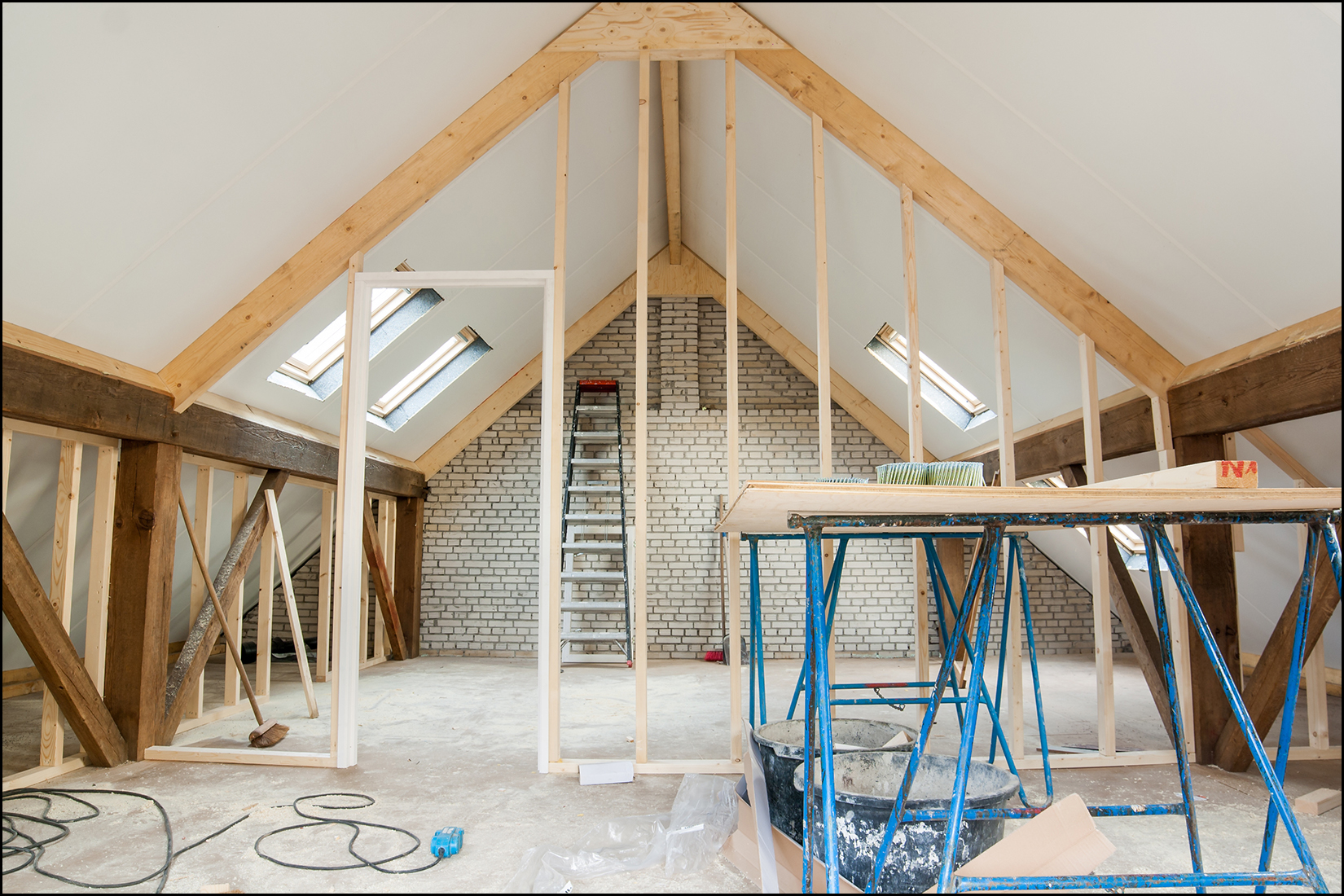 I'd love for mortgage interest rates to not be the sub-text for most real estate conversations, but it's the world we live in right now. 30 year fixed mortgage interest rates were below 4% from May 2019 through March 2022. During that time, lots of folks bought homes, and lots of folks refinanced their mortgages to get to pretty low mortgage interest rates. Thus, many homeowners (with low mortgage interest rates) find themselves considering whether their current home can grow with them as their needs change. If you need another bedroom in your home (as your family grows, or as you start working from home) you could either... 1. Sell your home and buy a new, larger home. 2. Reconfigure our renovate your current home to get the extra space that you need. Given that most homeowners have super low mortgage interest rates, many such homeowners are leaning heavily into the second option -- staying and trying to allow your home to grow with your needs. But... it isn't always possible. Some homes just don't have the right amount of space, or the right space in the right space, to allow them to grow to fit your growing needs. And thus, some homeowners find themselves concluding that as much as they would like to stay in their home and keep their mortgage interest rate - they need to get to a new house to have a space that works for them for years to come. | |
Lower Mortgage Interest Rates Will Likely Bring More Buyers Into The Market But Maybe Not More Sellers |
|
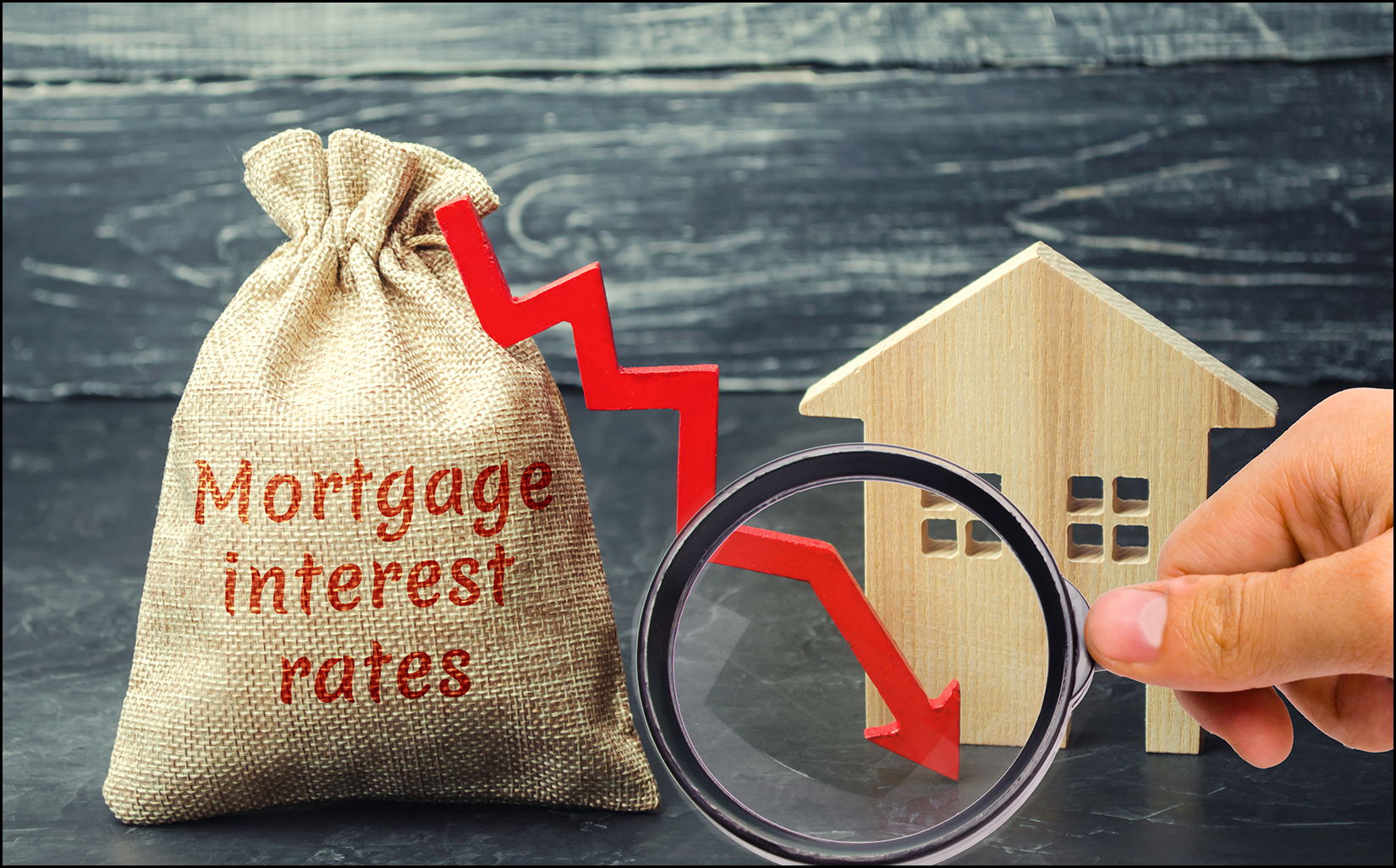 As noted yesterday... August 2023 & 2024 = higher mortgage interest rates, fewer contracts signed August 2022 = lower mortgage interest rates, higher contracts signed What's the connection? The higher the mortgage interest rates... 1. The fewer buyers who can and are willing to buy. ...but also... 2. The fewer sellers who are willing to sell and give up their (likely) low mortgage interest rate on their current home. So... if or when or as mortgage interest rates decline... will we see higher levels of contract activity? Maybe. Maybe not. As mortgage interest rates decline... 1. More buyers will be able and willing to buy. ...but... 2. Sellers might still be reluctant to sell, as lower mortgage interest rates won't necessarily be lower than their locked in mortgage interest rates. Thus, I suspect as mortgage interest rates decline, we'll see the pool of would be buyers expanding more quickly than the pool of would be sellers. | |
An Early Look At August Contract Activity |
|
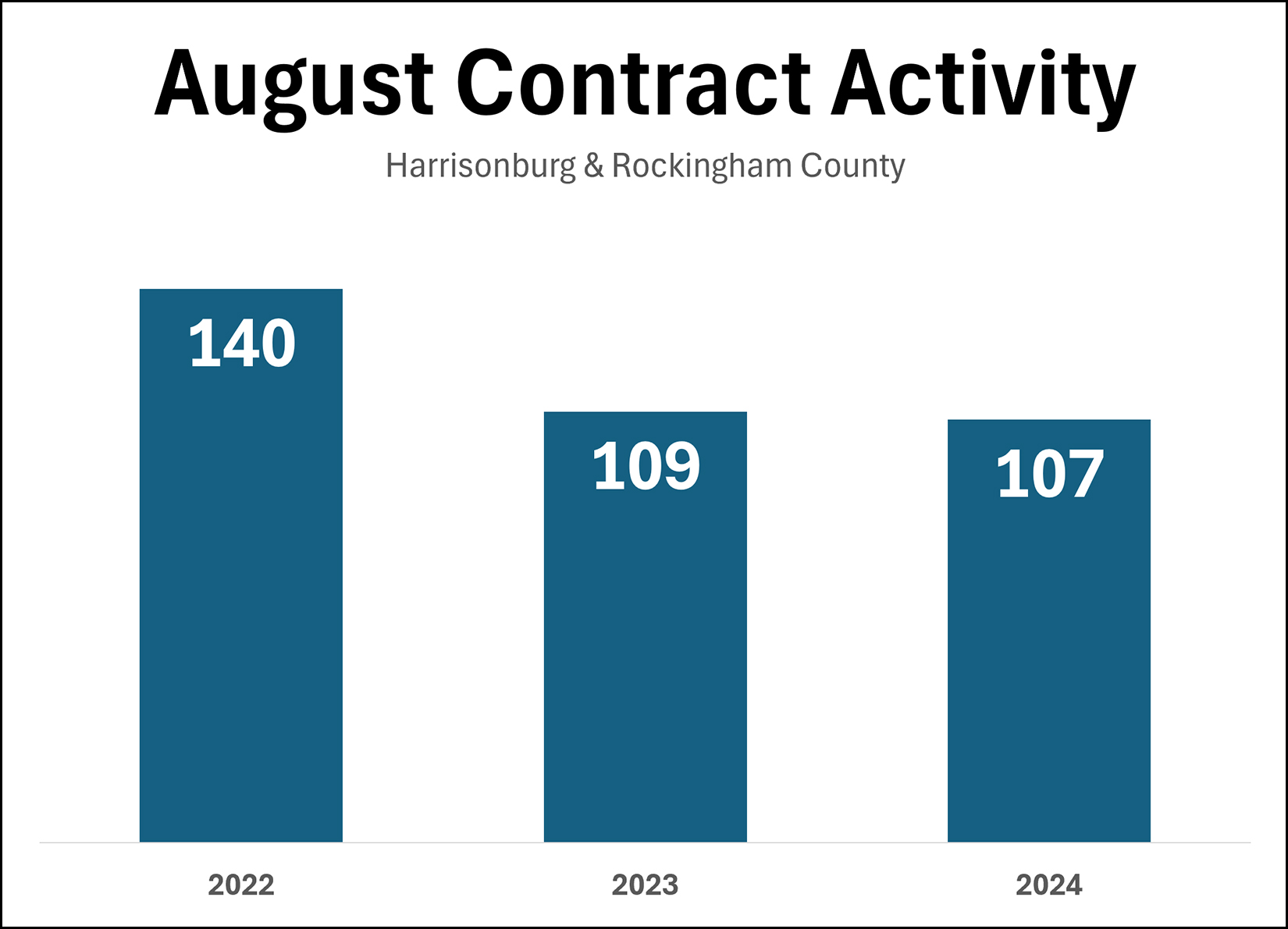 August 2024 was another busy month of buyers and sellers signing contracts to buy and sell homes. While 109 buyers and sellers signed contracts last August (2023) we saw about the same number (107) sign contracts this August (2024). Looking in a slightly longer context, both of these months of August are a good bit below the 140 contracts signed in August 2022. For a bit more context, here is the average 30 year fixed mortgage interest rate at the start of August for each of the past three years... August 2024 = 6.73% August 2023 = 6.90% August 2022 = 4.99% I think it is very reasonable to conclude that the lower numbers of sellers being willing to sell and buyers being willing to buy in August 2023 and 2024 are related to the higher mortgage interest rate during those years. | |
If I Am Selling My House Do I Have To Pay A Commission For The Buyer Agent? |
|
 If I Am Selling My House Do I Have To Pay A Commission For The Buyer Agent? Short answer - no. Longer answer - keep reading. For most of the transactions I have been involved with for the past 21 years... The sellers of most homes agreed in a listing agreement to pay a brokerage fee (commission) that would end up (in most transactions) being paid in part to the company and agent representing the seller and in part to the company and agent representing the buyer. But with home buyers now needing to sign buyer brokerage agreements before touring even a single house... ...and thus having more upfront conversations with their agent about compensation... ...some sellers might be wondering... If the buyer for my home is signing a buyer brokerage agreement to pay their agent for their services, do I have to offer to pay a commission to the buyer agent? Sellers are not required to offer to pay a commission to a buyer agent... though this is not actually new. You didn't have to offer to pay a commission to a buyer agent last year, nor do you this year. Given you don't have to offer to pay a commission to the buyer agent, what should you do, or what will most sellers likely do? WILL PAY - I imagine plenty of sellers will likely still plan to offer to pay the buyer agent's commission. In this scenario, the buyer will pay the seller X for the house and the seller will pay their agent's commission and the buyer's agent's commission out of the sales price. WON'T PAY - There will likely be some sellers who will not plan to offer to pay a buyer's agent's commission. In this scenario, assuming the buyer is represented by an agent, the buyer will pay the seller X for the house and the seller will ONLY pay their agent's commission out of the sales price. The buyer will then pay Y to their agent as a commission, resulting in the buyer paying X (sales price) plus Y (buyer agent commission) to purchase the home. What you as a seller might choose to do could be related to the balance of the market in your particular price range, or could be related to whether your target buyers are likely to have extra funds available to pay the buyer agent commission in addition to the sales price, or could be related to your overall pricing and marketing strategy. We will want to talk through all of these scenarios to determine your best course of action as to whether to offer to pay a buyer agent commission when you are selling your home. | |
How Much More Will A Home Buyer Pay For THAT Feature? |
|
 A common line of thinking among home sellers can be... I know that the last three buyers in my neighborhood paid $X for their homes... but those homes didn't have ___ feature that my home does offer... so certainly, a buyer will pay $X + Y for my house. Pardon my overly algebraic explanation. Put another way... if your home has a particularly unique feature... that will be seen as desirable by many, most or all buyers... we'll need to think about how much more a buyer will be willing to pay for your house based on that feature. This can be a rather mundane unique feature, such as a brand new roof compared to all of your neighbor's 25 year old roofs... or it can be a rather exciting feature, such as a freshly renovated primary bathroom compared to all of your neighbor's bathrooms that haven't been updated since the 1980's. Regardless of what the main point of differentiation that sets your home above and beyond nearby competing homes... we'll eventually have to translate that feature into a value difference. How much more will a buyer be willing to pay for THAT feature in your house compared to what another buyer paid for a similar home WITHOUT that feature? We can think about that question in a variety of ways...
In the end, though, we'll need to attach some dollar amount to the feature and decide if we are confident enough that a buyer will pay $20K for that feature (for example) such that we will price your home $20K higher than we would have otherwise. | |
Home Purchase Price In The Context Of Needed Or Wanted Further Improvements |
|
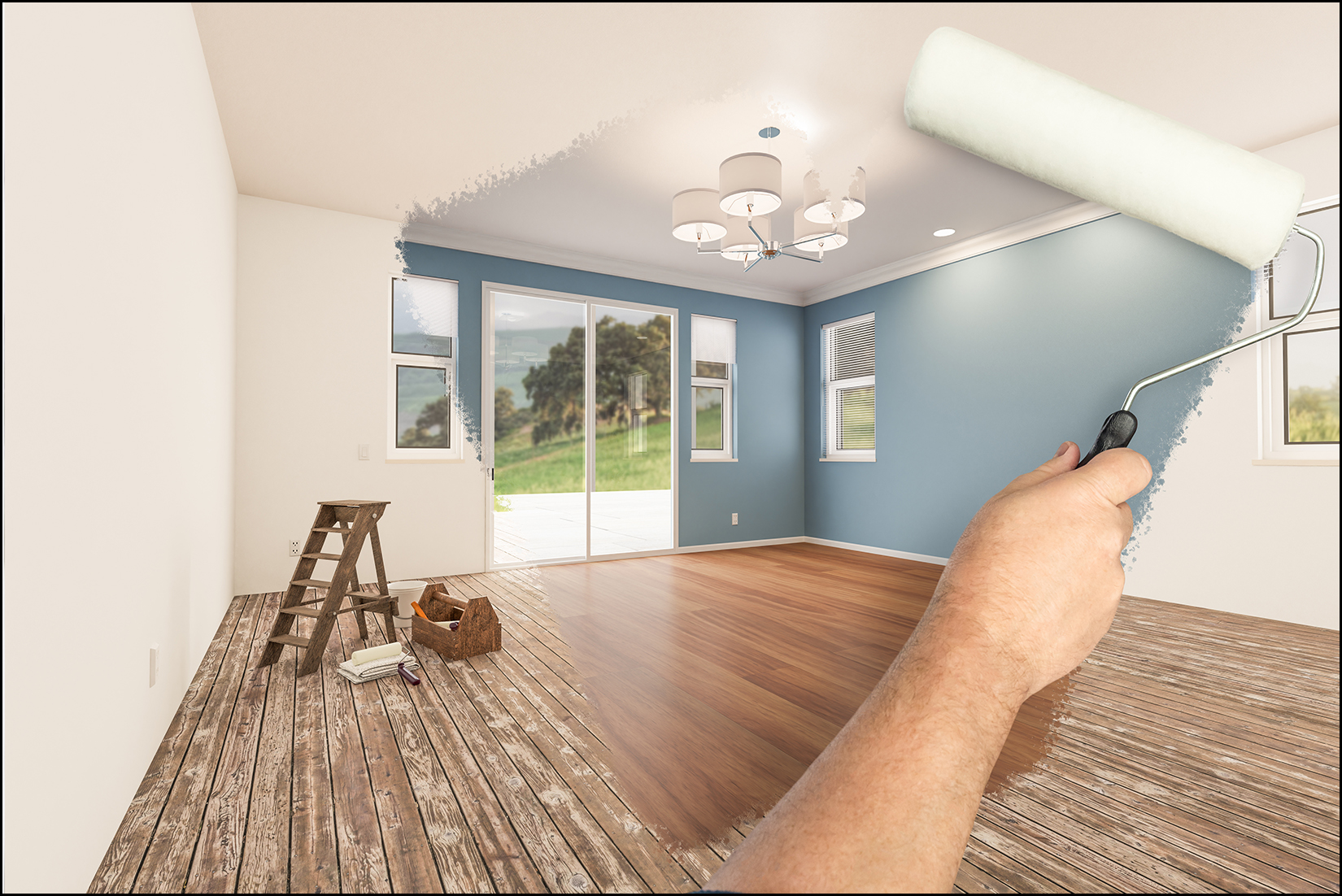 Many houses are still selling (going under contract) very quickly, sometimes with multiple offers. Some houses are not. Frequent feedback on houses that do not quickly go under contract is something along the lines of... We like the house... and the purchase price could work for us... but it's at the top of our price range... and we would want to (or need to) make a variety of further updates or improvements after closing. And so... these would be buyers of the could be home... don't make an offer. If you are in the process of selling your home, and you are getting this feedback (like the house, price is OK, but would want to make updates) this can almost always be translated into or better understood as... your list price is too high. Oversimplifying a bit... If a 2400 SF home is listed for sale for $500K and a buyer is comfortable paying $500K for a 2400 SF home... but they would want to (or need to) make $20K - $30K of improvements after purchasing the home... ...then they are not going to be willing to pay $500K for the house. If your house does not go under contract quickly once it is listed for sale, patiently sort through the feedback... but understand that much of the feedback (particularly the feedback described above) can be translated into feedback on your list price. | |
| Older Posts |
Scott Rogers
Funkhouser Real
Estate Group
540-578-0102
scott@funkhousergroup.com
Licensed in the
Commonwealth of Virginia
Home Search
Housing Market Report
Harrisonburg Townhouses
Walk Through This Home
Investment Properties
Harrisonburg Foreclosures
Property Transfers
New Listings

